#chekhov watches critical role
Text
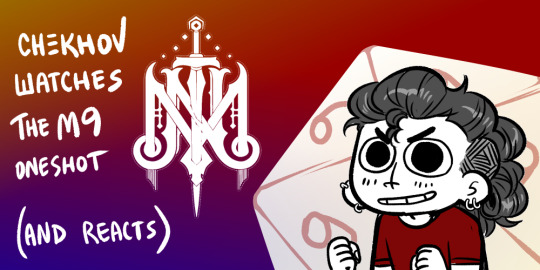

ECHOES OF THE SOLSTICE (PART 1)
spoilers, obviously.


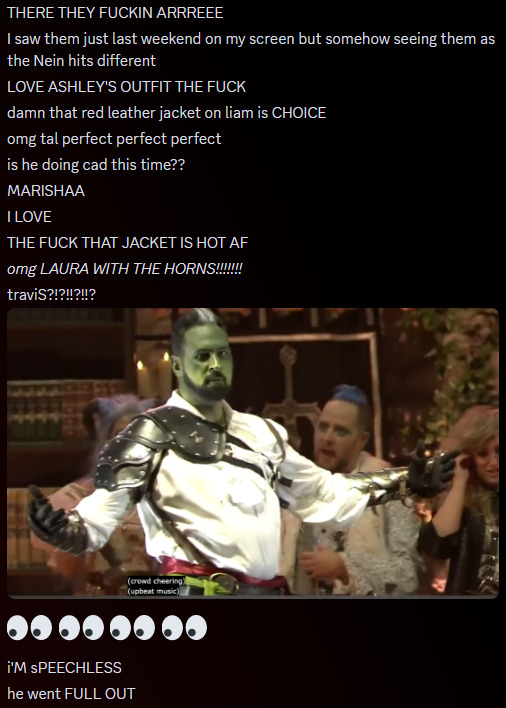
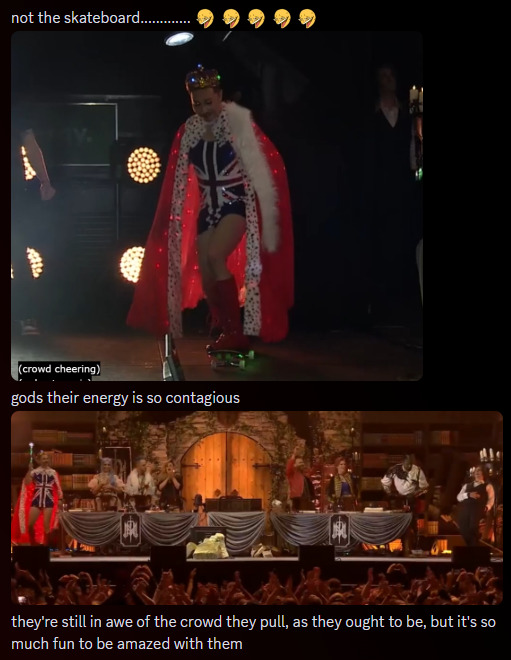

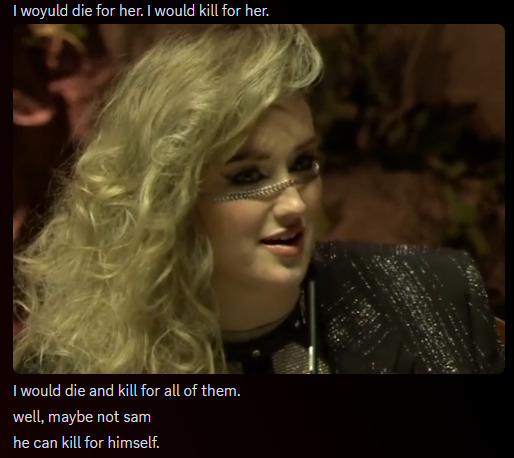
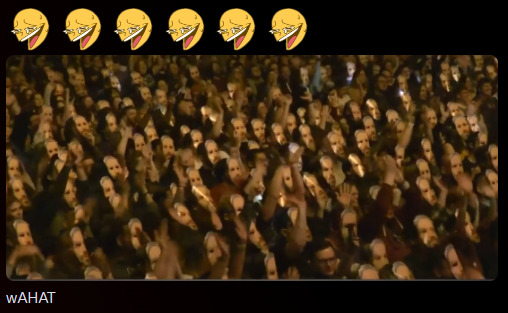
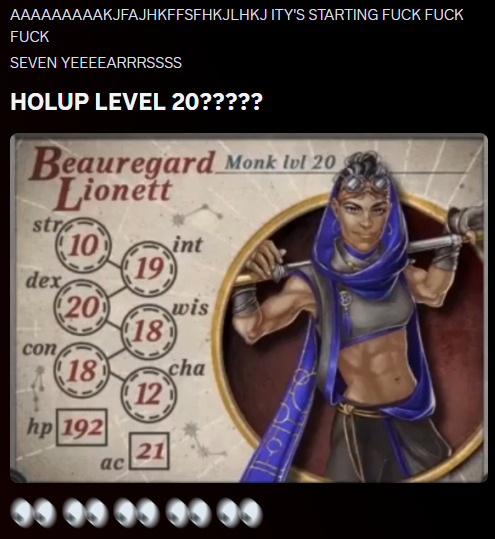
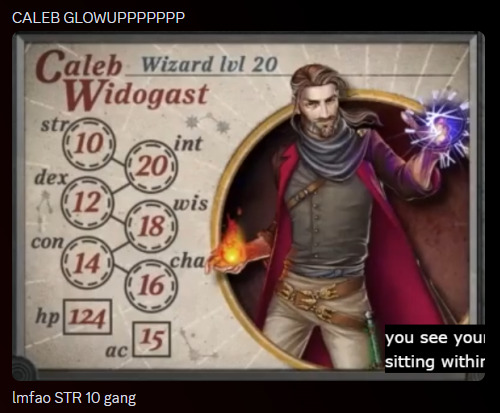



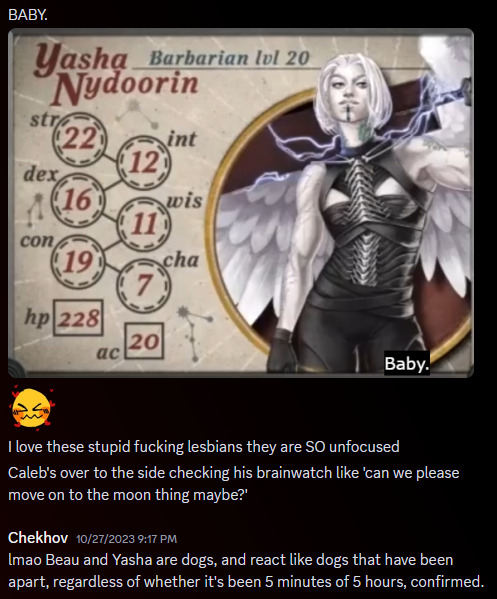
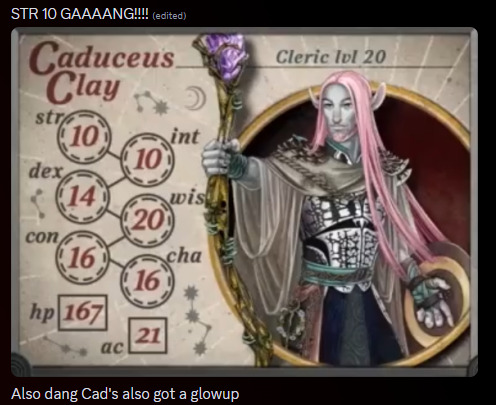
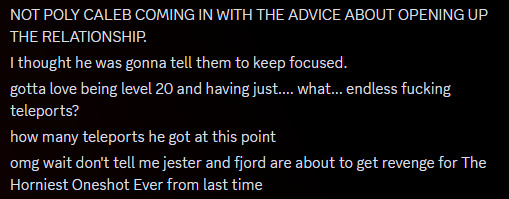
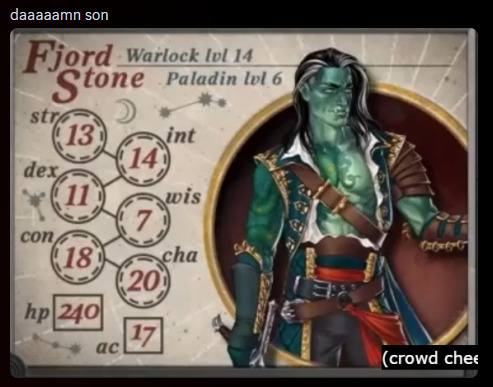










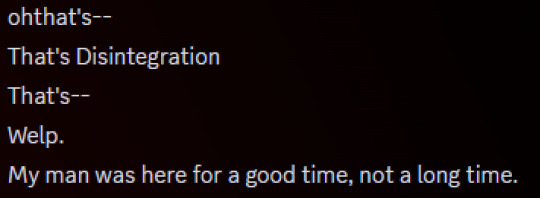

Next part will be in part 2!
#chekhov watches cr2#chekhov watches eots#chekhov watches critical role#chekhov watches cr#critical role 2#critical role echoes of the solstice#echoes of the solstice#mighty nein echoes of the solstice#mighty nein spoilers#long post
235 notes
·
View notes
Text
We are lucky to be alive in the age of Andrew Scott, an actor of extraordinary breadth, skill and sensitivity, who can terrify as Jim Moriarty in Sherlock, make us fall in love (inappropriately) as the hot priest in Fleabag and cry in All of Us Strangers. He can also astonish, last year playing eight parts in a stage adaptation of Chekhov’s Uncle Vanya. He recently became the first actor to win the UK Critics’ Circle awards for best actor on stage and screen in the same year. And his latest project, Ripley, is a beautiful and chilling adaptation of the Patricia Highsmith novel The Talented Mr Ripley, with Scott playing the lead, dominating all eight one-hour episodes. It’s been a wild, crowning year for the 47-year-old Irish actor. But in March his mother, Nora, died of a sudden illness; she is who Scott has credited as being his foremost creative inspiration. His grief is fresh and intense and for the first half of the interview it seems to swim just beneath the surface of our conversation.
��We go through so many different types of emotional weather all the time,” he says. “And even on the saddest day of your life you might be hungry or have a laugh. Life just continues.” We are in a meeting room in his management company’s offices, talking about his ability, in his work, to modulate between emotions, to go from happy to sad, confused to scared, all within a matter of seconds. How does he do it? Scott laughs. “I would say that I have quite a scrutable face — is scrutable a word? — which is good or bad depending on what you are trying to achieve. But my job is to be as truthful as possible in the way that we are, and I don’t think that human beings are just one thing at any particular time. It is rare that we have one pure emotion.”
It’s an approach that is particularly appropriate for the playing of Tom Ripley, an acquisitive chameleon who inveigles his way into the lives of others (in this case Johnny Flynn, as the careless and wealthy Dickie Greenleaf, and his on-off girlfriend Marge, played by Dakota Fanning). “Ripley is witty, he is very talented. That’s gripping, to watch talent. I can’t call him evil — it is very easy to call people who do terrible things evil monsters, but they are not monsters, they are humans who do terrible things. Part of what she [Highsmith] is talking about is that if you dismiss a certain faction of society it has repercussions, and Ripley is someone who is completely unseen, he lives literally among the rats, and then there are these people who are gorgeous and not particularly talented and have the world at their feet but are not able to see the beauty that he can see.”
The show was written and directed by Steven Zaillian, the screenwriter of Schindler’s List. It’s set in Sixties New York and Italy, and filmed entirely in black-and-white, its chiaroscuro aesthetic evoking films of the Sixties — particularly those of Federico Fellini — while also offering an alternative to Anthony Minghella’s saturated late-Nineties iteration that starred Matt Damon and Jude Law. This has a darker flavour. “I found it challenging,” Scott says, “in the sense that he’s a solitary figure and ideologically we are very different. So you have to remove your judgment and try to find something that is vulnerable.”
It was a tough shoot, taking a year and filmed during lockdown. Scott was exhausted at the end of it and had intended to take a three-month break, but delays meant that he went straight from Ripley into All of Us Strangers. “Even though I was genuinely exhausted, it was energising because I was back in London, I was getting the Tube to work, there was sunshine,” he says. “I found it incredibly heartful, that film, there were so many different versions of love … I feel that all stories are love stories.”
All of Us Strangers, directed by Andrew Haigh, is about a screenwriter examining memories of his parents who died when he was 12. In it Scott’s character, Adam, returns to his family home, where his parents are still alive and as they were back in the Eighties. Adam is able to walk into the memory and to come out to his parents, finding the words that were unavailable to him as a boy. Some of it was filmed in Haigh’s childhood home, and there was a strong biographical element for him and his lead. Homosexuality was illegal in the Republic of Ireland until 1993, when Scott was 16. He did not come out to his parents until he was in his early twenties. I ask if he was working with his own childhood experiences in the film. “Of course, so in a sense it was painful, to a degree, but it was cathartic because you are doing it with people that you absolutely love and trust. I felt that it was going to be of use to people and I was right, it has been. The reaction to the movie has been genuinely extraordinary — it makes people feel and see things, and that isn’t an easy thing to achieve.”
The film is also a tender and erotic love story between Scott’s character and Harry, played by the Irish actor Paul Mescal. The two found a real-life kinship that made them a delight to watch on screen and off it, as a double act on the awards circuit. “I adore Paul, he’s so, so … continues to be …” Scott pauses. “Obviously it’s been a tough time recently and he just continues to be a wonderful friend. It’s everything. The more I work in the industry, I realise, you make some stuff that people love and you make some stuff that people don’t like, and all really that you are left with is the relationships that you make. I love him dearly.”
Scott and Mescal were also both notable on the red carpet for being extraordinarily well dressed. Scott loves fashion and has a big, well-organised wardrobe that he admits is in need of a cull. “I don’t like having too much stuff. I really believe that everything we have is borrowed — our stuff, our houses, we are borrowing it for a time. So I am trying to think of people who are the same size as me so I can give some of it away, and that’s a great thing to be able to do.” One of his favourite labels is Simone Rocha. “I love a bit of Simone Rocha. What a kind, glorious person she is. I just went to her show.” Fashion, he says, is in his DNA. “My mother was an art teacher, she was obsessed with all sorts of design. She loved jewellery and jewellery design. Anything that is visual, tactile, painting, drawing, is a big passion of mine, so I have tremendous respect for the creativity of designers.”
Today Scott is wearing Louis Vuitton trousers and a cropped Prada jacket, dressed up because he is collecting his Critics’ Circle award for best stage actor for Vanya. I ask how it feels to have won the double, a historic achievement. “Ah …” he says, looking at the table, going silent, having just been so voluble. “I’m sorry …” His voice cracks a little. “It’s bittersweet.”
At the ceremony Scott dedicated the award to his mother, saying of her “she was the source of practically every joyful thing in my life”. Is it difficult for him to carry on working in the circumstances, I wonder. “Well, you know, you have to — life goes on, you manage it day by day. It’s very recent, but I certainly can say that so much of it is surprising and unique, and there is so much that I will be able to speak about at some point.”
He is looking forward, he says, once promotion for Ripley is over, to taking some time off, going on holiday, going back to Ireland for a bit. He has homes in London and Dublin. To relax he walks his dog, a Boston terrier, dressed down in jeans and a hoodie “like a 12-year-old, skulking around the city” or goes to art galleries on the South Bank — he was considering a career as an artist until he was 17 and got a part in the Irish film Korea. He goes to the gym every day, “not, you know, to get …” he says, flexing his biceps. “More that it’s good for the head.” He is social, likes friends, likes a party. When I ask if he gave up drinking while doing Vanya, which required him to be on stage, alone, every night for almost two hours, he looks horrified. “Oh God, no! Easy tiger! Jesus … Although I didn’t drink much, I did have to look after myself. But we had a room downstairs in the theatre, a little buzzy bar, because otherwise I wouldn’t see anybody, so I was delighted to have people come down.”
Scott was formerly in a relationship with the screenwriter and playwright Stephen Beresford and is currently single, although this is not the sort of thing he likes to talk about. He is protective of his privacy, not wanting to reveal where he lives in London, or indeed the name of his dog — but he swerves such questions with a gentle good humour.
He is famous on set for being friendly and welcoming, for looking after other people. “The product is very important, but most of my time is spent in the process, so I want that to be as pleasant and kind as possible. I feel like it is possible to do that, that it is an honourable goal.” He is comfortable around people, with an easy charm — no one I have interviewed before has said my name so many times. And although when we talk he sometimes seems reflective or so very sad, there are also moments when he is exuberant, silly, putting on accents. “I feel like, as a person, I am quite near my emotions. I cry easily and I laugh easily, and there is nothing more pleasurable to me than laughing.”
Scott was raised a Catholic and is no longer practising, but says his view about religion is “ever changing — I definitely have a faith in things that cannot be proved”. When he was younger and felt overwhelmed, just before or after an audition, he would go to the Quaker Meeting House in central London and sit in silence, something that made its way into the second series of Fleabag, in which Scott’s priest takes Waller-Bridge’s character to that same meeting house. “It’s just around here,” he says, standing up, looking out of the window at Charing Cross Road. “When Phoebe and I first talked, we met at the Soho Theatre. We talked about love and religion, we walked all around here. And I said, ‘This is a place I go,’ so we called in and there was no one there, so we sat in there and we talked. It was a really magical day.”
Scott says he sees all the different characters that he has played as versions of himself. “It’s like, ‘What would this version of me look like?’ rather than, ‘Oh, I’m going to be somebody else.’ You filter it through you, and you discover more about yourself. I think that is a very lucky thing to be able to do, to find out more about yourself in the short time that we are here.”
#Andrew Scott#Ripley#Nora Scott#Critics Circle#Vanya#Chekhov#West End#All of Us Strangers#Paul Mescal#Hot Priest#Fleabag#Phoebe Waller-Bridge#Jim Moriarty#Sherlock#Patricia Highsmith#The Talented Mr Ripley#Dickie Greenleaf#Marge Sherwood#Dakota Fanning#Johnny Flynn#Steven Zaillian#Matt Damon#Jude Law#Anthony Minghella#Simone Rocha#Louis Vuitton#Andrew Haigh#Korea#Stephen Beresford
62 notes
·
View notes
Text
Merrily We Roll Along review summary Part 1
Peter Marks, Washington Post
Like precision code breakers, the team responsible for the revival of “Merrily We Roll Along” have cracked it.
The blessed contributions of Groff, Mendez and Radcliffe — in addition to Krystal Joy Brown, Katie Rose Clarke and Reg Rogers in crucial supporting roles — coalesce in a way that feels almost spiritual.
But when you’re hearing his music so beautifully realized — Radcliffe keeps up impressively with musical-theater prodigies Mendez and Groff — you grasp even more deeply the melodic and lyrical sophistication at work.
Groff’s transformation-in-reverse is a perceptive journey as well, from remorseful Hollywood sellout to star-struck starving artist, pressing his nose up against the window of fame and riches.
Ideally, this Broadway incarnation will be both a hit and a reflection of the higher aspirations of musical theater. It’s even tighter, funnier and more touching than what Friedman staged off-Broadway.
So much ingenuity. So much joyful creativity. So much for audiences to savor.
Kobi Kassal, Theatrely
Further, it's hard to go wrong when you have Daniel Radcliffe, Jonathan Groff, and Lindsay Mendez above the title. The heart of the show lies with this trio whose genuine connection and truth shines out across the Hudson stage eight times a week. Groff, who has the charisma down pat, dazzles as Frank. When paired with Radcliffe’s Charley, filled with loveable charm, and Mendez’s Mary who is utterly gut-wrenching to watch as her true love slips away, this trio equals Broadway perfection.
Merrily marks the third Broadway revival of a Sondheim work since his death, in addition to the premiere of his final work, Here We Are, at The Shed. Many of his shows are beloved, but if you want a healthy dose of Broadway serotonin, get thee to the Hudson immediately. Truth be told, you don’t need to listen to the critics, and if you have gotten this far in the review, I think we are all on the same page. Some true theatre magic is happening on that stage, and for that we will forever be grateful.
Sara Holdren, Vulture
It’s possible for Frank to swing and schmooze his way through this scene as the worst version of himself: “Who says, ‘Lonely at the top’? / I say, ‘Let it never stop!’” he sings to his crowd of sycophants. But Groff is an actor who’s able to communicate hurt and humanity even through a carapace of ego and moral deficiency. (In this way he reminds me of Matthew Macfadyen: Who among us has any business feeling empathy for Tom Wambsgans? And yet …) All through Merrily’s opening scene, Groff’s eyes are dead hollows — deep, dark wells with reservoirs of tears way down at the bottom, threatening to make their way up. He smiles, he sings, his body propels itself around the room, and he’s not there. His Frank is the worst version of himself, but he knows it, and he’s terribly alone and afraid. Watching Groff — who, as the show moves forward and backward, becomes visibly younger: driven, yes, but also sweet and earnest, almost puppyish — I thought of Chekhov’s successful, unprincipled writer Trigorin, who tells his lover: “I haven’t got any willpower. I never have had … Go on, take me, take me away with you. But please, don’t ever let me out of your sight.” Groff makes clear that Frank’s is a tragedy of weakness, not simply of greed.
And Charley! As the twitching, high-integrity, high-anxiety writer, Radcliffe is a complete delight. Next to Groff’s Frank, who’s tall, square-shouldered, and — at least outwardly — self-possessed, Radcliffe is a vibrating sprite, the kind of person whose big brain you can practically see smoking as it spins.
The enlivening pulse created by Radcliffe, Mendez, and Groff gains strength and drive through the production’s rock-solid ensemble. Gilmour (also the costume designer) dresses them in softly period, unified swaths of color as the play moves back in time — blues, then beiges, then, in the lavish, La Dolce Vita–ish early ‘60s, in hard black and white. There’s something smart happening here: Groff, as Frank, wears varyingly sophisticated versions of the same white shirt and black trousers throughout the show, but at the top of Act Two, as Gussie (not yet his wife) seductively introduces him to “The Blob” — a pulsating swarm of influentials, “the ones who know everyone that everyone knows” — Frank’s clothes match the company’s for the first time. He is, whether consciously or not, getting sucked into something. No — it already has him.
Some shows can withstand miscasting — turns out, Merrily can’t. (It’s often said that the casting of very young actors was a large part of the original production’s failure.) Even the big producer, Joe Josephson, who can come off as a Hollywood hack with dollar signs for pupils, is brought a sense of hangdog appeal by Reg Rogers. You get the feeling that Josephson is affable at heart, tired in soul, and that even he might have had ideals once. Friedman’s great insight — perhaps owing to her own long career onstage — is to have sought out actors she, and we, can entirely trust, and to trust them. (It sounds simple. It’s not.) She locates the play’s potential to be caring rather than callous not on the page but in the specific human beings who are here, doing this thing, right now. A central trio as sensitive and superb as this one doesn’t just make Merrily more moving; it makes it much more fun. It even adds a faint glimmer of something resembling hope. If Frank can reconsider, then he may yet change. Or he may not. But either way, an actor must show us, as Groff does, a true encounter with the mirror. With their irresistible energy and chemistry, Mendez, Groff, and Radcliffe lift Merrily up, yet keep it grounded with real, apparent affection and emotional heft. They are the ones reviving the play, by revealing and jump-starting its heart.
9 notes
·
View notes
Text
i am posting all spoilery thoughts about X under the read more, but i will say this above the cut: ABSOLUTELY ONE OF THE MOST INTERESTING AND FUN MOVIES I’VE WATCHED IN A LONG TIME!!
god, if you aren’t watching it or making plans to watch it, what are you doing!!
okay, proceed with caution because i include major spoilers including the order of who dies dkfdkf:
first, i think the movie has a LOT of fun with its own self-awareness. it doesn’t try to be pretentious or disguise itself as something it’s not. it is a movie that desires to entertain its audience and it does exactly that.
plot/narrative wise, the movie excels. simple on the surface with deeper meaning/undertone. i think the themes of artistry, aging, and sexuality all worked very well together to keep you invested in the movie without making you feel confused or bored. the movie allows you to reflect while watching and somehow doesn’t make you feel like you missed something along the way.
of course, i know many people are interested in the acting performances from the cast and i’m happy to say that there is something for everybody in this movie, no matter which actor you adore. i have seen acting from nearly everybody in this cast and this movie was just phenomenal! i’m so happy that everybody gets their share of screen time and punchy lines and wonderful acting moments. full disclosure, if you know me, you will assume i am biased saying this but i was incredibly impressed with brittany snow’s acting in this movie. she had great screen presence and wonderful chemistry with everybody in the cast. jenna ortega and mia goth were also fantastic! and truly, jenna is so deserving of the scream queen title people have been bestowing upon her. kid cudi??? a true king?? i swear to god, this cast was so perfectly picked. i have seen a number of critic reviews praising the cast chemistry. each actor fit into their role/trope really well. i think brittany’s character might be the *most* “trope-y” (is that a word? no) but she steals a few scenes. shamelessly, one of the best scenes in the movie is one that almost seems out of place - it’s where she sings a beautiful Landslide solo and it almost makes you forget what you’re watching. also, i’m going to need brittany snow to use her lower register more because it was stunning.
and i have to do another shoutout to jenna ortega because holy shit. she has basically grown up on screen and her acting chops are phenomenal. i LOVED her character and the role she had in the group dynamic. she is fucking GREAT in this role and i hope she continues picking good scripts/roles like this if she wants to continue her scream queen career.
mia goth aced it. kid cudi is amazing. martin henderson was great too. omg and owen campbell had a really great handful of stand-out moments too!! like this whole cast! holy shit! literally nothing bad to say about anybody.
i think, based on what i’ve read in my askbox, there will be viewers who will scoff or roll their eyes at the foreshadowing that happens in the movie. many obvious chekhov’s gun moments but again, the ease at which ti west incorporates everything into his ultimate narrative is a testament to his storytelling. i don’t joke about that kind of thing. in terms of gore and death and general horror elements, there were definitely moments where i flinched, but i wasn’t overtly spooked out. one or two deaths were not great but i appreciate the low impact overall. like if you averaged out all the character deaths in the movie, you will find that the net violence/gore/impact is a lot lower than you would expect.
also - old people. are old people to be feared or sympathized with? who knows? WHO TRULY KNOWS? and as i grapple with my own thoughts about aging as an elderly 27 year old, i wonder if i too could have told a compelling tale in the horror genre...
but i digress - i think in horror, a few elements are ever present in the genre. the unexplainable, unattainable understanding. there is no “why” and simply we are forced to confront certain fears. i think when those fears are realized in very tangible, existing real-life fears (aging being one of those for some people i’m certain), there is something even more foreboding. i wonder how the story and experience would have changed if ti west had not used “old people” as the vehicle.
finally, nudity. it happens. quite a bit. this movie deserves its R rating. i think there might actually be more nudity than there is “horror”. the movie leans into the horror element almost solely by the fascinating shots and general aesthetic. the editing is great too, with some truly gnarly cuts and transitions that, by way of how jarring they are, make for great atmospheric tension.
here’s the death order by actor name:
owen campbell
martin henderson
kid cudi
brittany snow
jenna ortega
anyway, please go watch this movie! i hope you enjoyed this fangirl-y moment
65 notes
·
View notes
Text
Fourteen and a half hours later and my frustration over the bullshit that was the “season finale” of the Bad Batch burns hotter than ever. I posted a warning last night for people to use filters because this post is going to be anti-Omega and severely critical of the Bad Batch writing.
Scroll by now if you somehow didn’t heed that warning…
…
…
…
Filler.
That’s what this episodes was. Thirty minutes of no stakes, no consequences, no emotional impacts or investment in the outcome (because you could telegraph they were all going to survive), little actual drama, and a massive copout in the end (which I predicted weeks ago).
There’s no build into season two (yay more of the same aimlessly plodding along and working for Cid shit we have gotten all this season), no hook to keep us interested (Nala Se working for the Empire was predicted back during Fives arc), the characters learned nothing and are essentially left as they were in the beginning of the season.
We got tweets hyping the hell out of this episode…
And that’s all it was: hype.
From episode one the characters of Hunter, Wrecker, Tech, Echo, and especially Crosshair have been de-characterized, pushed aside for a child character that makes no sense (and who was also hyped up and fallen flatter than a pancake), sent on missions which were really cameo appearances to lead to Rebels (hyping that disaster in hopes of getting more people to watch it), wasted time on things that went nowhere (Omega being hunted as a prime example), and rehashed and repeated plotlines from other shows and movies.
Bad Batch did nothing but flatter the egos of Dave Filoni and Jennifer Corbett by highlighting characters from Clone Wars and Rebels. Characters that were unnecessary and best held for season two or three of BB to have worked in the larger scheme of things.
Rex was all but wasted in his few appearances. His only real purpose was the first of many glaring plot holes the show suffers from: the inhibitor chips.
Gregor and Howzer both were also wasted. Chekhov’s Gun, folks…. “details within a story or play should contribute to the overall narrative.” The purpose of this is to keep writers from making false promises by including details, events or characters that do not play a crucial role in the outcome of the story.
Cody, Wolffe, even Kix were kicked aside for the Martez Sisters, Hera and her parents, and the also wasted Cad Bane (who was bested by a child).
Cody especially should have been included in this show at some point since a) he was kriffin Marshal Commander and b) had a connection to Clone Force 99.
Folks, I’ve read over a thousand pieces of fan fiction in my time on the internet. I’ve seen better from the worst fan fic writers than what we got in Bad Batch. Those writers have passion for their fandom and the characters.
The writers of Bad Batch produced a soulless, aimless, plot-hole riddled mess that left me empty, cold, and unsatisfied by seasons end.
No big questions were asked or answered.
No big moments of revelations that changed lives occured.
No development of any of the characters.
No epic battles.
What we got was lied too.
The Bad Batch wasn’t about The Bad Batch.
It wasn’t even about the clones.
It was about one character and one character only: Omega.
The child created before the Bad Batch but who nobody, least of all Clone Force 99 saw until their magical return to Kamino following Order 66.
Omega who saved the day not once this episode but three times.
Omega who clearly wasn’t part of the original plans for the show and who was painfully shoehorned in just to pacify the Couch Warriors.
Omega who took up episode space and scenes needed to develop and cultivate an actual plot.
Omega who knows everything, can do everything, is loved by everyone she meets, has no flaws, is a pure genetic copy of Jango, learned no real lessons (outside of what dirt feels like) or experienced any real growth in sixteen episodes.
Omega who has thicker plot armor than even Ashoka Tano (who was also shoehorned into many episodes and arcs she wasn’t needed in).
When you remove Omega, the show flows in a way that almost makes it work. The finale would have functioned better if she wasn’t involved because it would have forced the BB and Crosshair into a higher stake situation. The element of fear about their survival actually comes into play and there’s an emotional investment built to see them find a way out of their predicament.
AZ was also a copout. It was the one character defining moment this show had to give Omega something to actually grow and learn from next season. Instead, he’s saved and the BB fly off Kamino in the midst of sunshine while leaving Crosshair behind (again).
Speaking of, a stronger finale would have had Crosshair go with them. Why? Because their struggles to overcome their differences, Crosshair struggling with his chip and choosing his brothers or the Empire sets up season two.
Lazy, inconsistent writing.
That’s all this season has been.
I will continue to say it despite the hate it inspires.
We got robbed, folks.
Again and again and again.
We should be blasting dear ole Dave and all the writers on Twitter for lying to us. They promised us Bad Batch, hyped up epic moments that’d leave us in tears and gave us a show that was anything but.
#the bad batch season finale#the bad batch critical#the bad batch#the bad batch series#the bad batch 1x16#anti omega#omega sue#the ballad ends with disappointment
17 notes
·
View notes
Text
A Few Thoughts On Wonder Woman 1984
I watched WW84 the other day, and was gonna do a review about it. The problem is, to put it simply, the movie is controversial. And for good reason. There’s a lot of blatantly racist aspects to it. But I am a white person, who has never and will never experience racism, so I cannot properly explain the ways in which the movie was racist. I would highly recommend looking up criticisms of the movie from reputable sources and people of color that will explain it better than I ever could.
Now, my thoughts on the movie. It was a drag. It suffers from something I’ve been seeing a lot of in blockbuster action films lately, where they all try and hit that mark of being at least two and a half hours long. But, as that one post said, not every movie is the Lord of the Rings. Not every movie is an epic, where each scene flows seamlessly into the next, making three hours feel less like a drag and more like a journey. And WW84 was not an epic. The first part, where a young Diana competes in Amazonian Olympics, is far longer than it needs to be. You could cut out probably half of the action and leave the dialogue, and it would give you the same affect. I also think that, because there was less of a focus on Diana and more of a focus on characters that you don’t care about who aren’t built up in the least, the movie suffers from trying to introduce those characters in a meaningful way.
Let’s talk about Barbra for a second. I know very little about Wonder Woman villains, so I don’t know anything about the Cheetah. But I’m a geologist. And Barbra was... bad. Mainly because for the first half of the movie, I thought she was just written really poorly and was just really irritating. But what made it worse was how, after she wishes to be more like Diana, she gets like... sexier? The WW movies claim to be bastions of feminism, and yes, being sexual is an important feminist aspect for many women. But Diana isn’t this beacon of sexual energy. She’s just a person. She doesn’t have these magic sex powers that lure men towards her. So why, then, does Barbra suddenly lure men towards her after her wish?
The plot, especially surrounding the wish business, made almost no sense. And I can handle a few plot holes here and there, I’m a Doctor Who fan, I eat plot holes for breakfast. But these plot holes nearly break the movie. You never really understand why or how the rock works. You never understand where the rock came from. You never really understand the rules of the wishes, especially once Max Lord turns into Rock Man. And the fact that so many questions are raised and never answered about the rock leaves you as a viewer unsatisfied, wondering exactly why these things are happening to begin with.
I didn’t enjoy Pedro Pascal as Max Lord. Now, I like Pascal. I think he’s phenomenal in the Mandalorian. I even enjoyed him when he starred on the Mentalist for that one season. But he didn’t fit this role, and part of it is due to the fact the role itself is flawed. It feels like it was haphazardly slapped together, like they needed a big bad and needed one fast. Also, and I don’t know if this is just a nitpick, but it seemed to me as if Pascal kept switching between having an accent and not having one? I could be wrong, but that was what it seemed like, and it didn’t seem like a directorial choice.
Another nitpick was the special armor Diana had. It was hyped up the whole movie, and then she only uses it for like, a few minutes. This also happens with Cheetah. If you’re gonna pull a Chekhov’s gun like that, at least make it worth it. Also Cheetah looked like she could’ve been in Cats (2019) if the Cats production team made the cats look a little more human. I also question if any of the people doing the CGI for Cheetah knew what a cheetah actually looks like.
As much as I enjoy Chris Pine as Steve Trevor, he did not need to come back for this movie. It felt to me like they had probably had Chris Pine signed on for two movies, and needed a way to write him into this one. The fact that Steve was effectively possessing some random guy while Diana dragged him across the globe as well as having sex with him was concerning at best, bordering on disturbing when you thought about it too much. It seemed as though the writers did not consider the ramifications of these actions.
Overall, the writing was poor, the directing was poor, and the controversy stains the movie. The acting was, as usual, good, and the score was delightful. I found the 80′s setting to be enjoyable, and for the most part not hammed up and pandering like some 80′s settings are, except for when there’s a focus on Cold War politics. That felt off-color somehow, like they were almost turning the nuclear tension into the punchline of a joke. The only part I could say was really my favorite was the cameo by Lynda Carter at the end, which was genuinely fun and I wish we could have seen more of her.
I’ll give this one a... 5/10. I hesitate to rate it, given the controversies of it, but even with all controversy aside, I just don’t think it’s all that good of a movie. Not the worst two and a half hours I’ve ever spent watching a movie, but definitely not the best. As far as DC movies go, the first WW was infinitely better, and even Aquaman was a better film. This one is about the same level of confusing as Justice League.
Really, if you want more Wonder Woman content, I would recommend watching any of the Justice League cartoons she appears in, or reading the comics. You’ll be better off.
7 notes
·
View notes
Link
“These are the perils of working from home,” mutters David Tennant, typing into his phone, filmed by his computer and watched, bemusedly, by me.
The 49-year-old actor has been texting, intermittently and apologetically, throughout our Zoom call. One of his five children (aged 18, nine, seven, four and eight months) has returned to school, and it seems pickup arrangements have been miscommunicated.
Tennant’s correspondent – I assume it is his wife, Georgia – is messaging from inside the house; Tennant is in the garden, his long lockdown locks pushed back into a Beckham-style headband. Over yonder, he gestures off-camera, a homeschooling lesson is under way: “I came outside to avoid the maths.”
Yet Tennant seems to have embraced the realities of home life, with two BBC projects drawing on his experience of raising a family. In the meta, of-the-moment series Staged, he and Georgia play versions of themselves in lockdown in their Chiswick home, while There She Goes (which returns for a second series tomorrow) captures an oft-unspoken truth about parenting, says Tennant: that “it’s sort of a slog”.
Coupled with doing interviews from his garden – Tennant tips his camera to show me Myrtle the cockapoo, flopped at his feet – it offers a surprising glimpse into the family life of an actor who has previously been reluctant to reveal any of it.
“We’re not quite as squeamish as we were,” he agrees, not least because his eldest son, Ty, is now also an actor. “I don’t think we’ll ever be sharing pictures of our children in Hello! magazine, but I think a lot of that comes from an insecurity about being uncovered or invaded. The longer you’re together, the less that feels like a threat.”
Tennant met Georgia (then Moffett) in 2008 on the set of Doctor Who – her father is a former Doctor, Pete Davison. “As our relationship was born out of people trying to stick lenses through windows, it’s taken us a long time to slough off that residual nervousness about sharing anything.”
These days, their guard is low enough for Georgia to post on Instagram a shot of herself breastfeeding – and to rail against Mark Zuckerberg when the image was removed by Facebook for breaching community standards (“I’ll come round there and squirt you in the eye”).
But, Tennant adds: “It’s still important to us that the characters in Staged are not us,” “David” being “more pathetic” than Tennant and “Georgia” more indulgent of him. “We’re not telling the actual story of our private life.”
There She Goes, however, he praises as scrupulously honest. The comedy stars Tennant and Jessica Hynes as parents of a child with a severe learning disability, based on the experience of the writers Shaun Pye and Sarah Crawford with their daughter, who was born with an extremely rare (and still undiagnosed) chromosomal disorder.
Tennant plays Simon, the character Pye based on himself: a loving but somewhat hapless father, always out to foist young Rosie on to his wife so he can head down the pub. Tennant says he tried to catch Pye out on set: “I’d go: ‘This bit we’re doing today – that didn’t really happen, did it?’ And everything is true.”
The first series was widely praised for refusing to sugarcoat the realities of parenting and marriage, while still finding moments of sweetness. Hynes won a Bafta for her turn as Emily, Rosie’s harried but devoted mum who, in a low moment, admits to struggling to love her newborn.
Simon, meanwhile, leans on booze and dark humour. There She Goes can be an undeniably uncomfortable watch. But the dual narratives of each episode – switching between a challenging but joyful time for the family and a more desperate early one – provide relief and perspective.
Tennant considers the series a mainstream comedy. Yet there had been trepidation within the BBC about how it would be received, he says, “because it lacked a certain sentimentality and political correctness – there was a real fear”. He disdainfully recalls a journalist at the press launch playing devil’s advocate, warning of a coming “shitstorm”: “He said: ‘You are going to be destroyed for putting this on television.’ We all hoped he was wrong – but we feared that he might be right.” And this was after the huge critical success of the police drama Broadchurch, which might easily have convinced Tennant he could do no wrong.
The casting of a non-disabled actor as nine-year-old Rosie – who is non-verbal, with the mental age of a toddler – was one sensitivity, says Tennant. The possibility of casting an actor with a learning disability had been explored, he says, “because, of course, that’s a live issue and one that has to be rightly unpicked”. But the demands of the role were found to be too great for a young actor with a disability. “Anyone who appreciates the kind of challenges that a child like Rosie would have doesn’t doubt that it would not really have been possible.”
Miley Locke, who is now 11, was “an incredible find”, says Tennant, praising her as nimble and uninhibited in a challenging role. Locke has met Jo, on whom Rosie is based, and has “an incredible capacity to find the truth of that character”, he says. “She’s also very game – I’m endlessly having to pick her up and fling her about and yank her around …”
Any parent will identify with “that constant sense that you’re falling short”, he says – now, perhaps, more than ever. A scene in which Emily tries desperately to work in the face of Rosie’s demands has taken on new relevance during lockdown. “Well, quite,” says Tennant, while texting in response to the latest news from Georgia. “Erm. Sorry …”
A big part of the challenge of shooting Staged was finding moments when the children were “either asleep or quiet”, but Tennant counts himself as “phenomenally fortunate” to have had the work, given how acting has been affected by the pandemic. This October, he was due to appear in CP Taylor’s play Good; that now seems unlikely.
Even when theatres are able to reopen, Tennant does not foresee audiences flocking back, “to sit there watching three hours of Chekhov as someone coughs all over them”. The impact on British culture could be catastrophic, he fears, even for institutions such as the National Theatre and the Royal Shakespeare Company. “It’s a huge bill just to keep those buildings running … We could be left with a cultural scene that’s vastly changed, and that’s a huge part of who we are as a nation.
“Even if the theatre is of no interest to you, even if it feels like an elitist playground, it’s places like that that all the other creative industries feed off,” he says, adding that the arts make a significant contribution to the UK economy – nearly £11bn in 2016, more than agriculture.
Tennant’s career first developed in theatre. As a teenager in Paisley, the son of a Presbyterian minister, he became one of the youngest students at the Royal Scottish Academy of Music and Drama. Even as his work in television and film has taken off, Tennant continues to be a regular on stage, especially with the RSC.
It faces a “titanic problem” in the pandemic, he says, having furloughed 90% of its staff. Government intervention is needed to support theatres until they can reopen, he says, but he is sceptical of it materialising. “If one felt more inclined to trust this government, one might relax, but they haven’t exactly covered themselves in glory thus far.” In fact, since I spoke to Tennant, the government has promised the arts and heritage sectors a rescue package worth £1.57bn, which the playwright and funding advocate James Graham described as “surprisingly ambitious”.
A longtime Labour supporter, Tennant appeared in an election broadcast in 2015 before becoming disillusioned with Jeremy Corbyn’s leadership (to summarise various diplomatic responses to interviewers). Asked if he was a fan of Corbyn in 2017, he said he was a fan of the party – although its ambivalent position on Brexit (which Tennant has called a “shitshow”) was a sticking point.
Before last year’s general election, he said he was not even sure if he would vote for Labour. He did – to return Ruth Cadbury to her Brentford and Isleworth seat: “And, also, what was the actual alternative?”
He admits he found Labour’s defeat and the postmortem “disappointingly predictable”, although he still struggles to fathom how so many red seats turned blue. “How do you go from ever being a Labour supporter to supporting Boris Johnson?” he asks, dumbfounded.
He expresses some limited sympathy for politicians handed a pandemic when they thought they “were only going to have to talk about Brexit”. “But if you choose a cabinet purely to surround yourself with people who won’t disagree with you, you’re not necessarily getting the greatest brains in the country,” he says, although a caveat is quick in coming. “One might postulate, were that to be the case, and I’m not for a minute suggesting it is …”
Last year, Tennant singled out Michael Gove’s call for “enough of experts” as a “political lowpoint”. That attitude has had deadly consequences during the pandemic, I suggest. Now the government is “hiding behind them”, he agrees – “selectively, of course. If the experts then say: ‘We told them not to do that,’ suddenly they’re evil again.”
He shakes his head in despair. “Ugh! It’s a very sad state of affairs. Remember when there used to be clever people? When you look back on David Cameron and George W Bush with some kind of sentimentality, you think: ‘Jesus – how low have we plummeted, when they look like better options than what we’ve got currently?’”
Under Keir Starmer, Tennant says Labour “are looking a lot stronger”: “We’ve got a clever grownup in the room, which makes the other side look as ridiculous as they are. Let’s hope he can fulfil his early promise.”
Tennant has said he was inspired to act by watching Doctor Who at the age of three. When he was cast as the 10th incarnation of the Doctor, in 2005, he quipped that the first line of his obituary was written. Ten years since ceding the role to Matt Smith, Tennant remains as connected as ever to the programme, recording a new Doctor Who audio drama while in lockdown. “It’s a nice show to be associated with, because people feel kindly towards it,” he says. “You may not be a fan, but it sort of sits there in the cultural firmament. As a nation, I think we’re quite proud of it.”
Unlike many vehicles for British nostalgia, the malleability of the format has allowed Doctor Who to move with the times, he thinks. “It absolutely comes with all that nostalgic goodwill, but it also manages to live in the moment.
“It felt like a very different show in 2005 than it did in 1963, but it also has that link to the past – which is a positive, rather than preserving it in aspic in any way.” And the Doctor, defined by his (or her) kindness, a peaceful champion of the underdog, is “a wonderful character to aspire to. It’s about being the cleverest person in the room, not the strongest.”
Tennant, meanwhile, remains in his garden, the school pickup plan no more clear for all the messages sent back and forth over the threshold. “Probably would have been quicker just to go and have a conversation,” he says, cheerily. “But less fun for you, obviously.”
8 notes
·
View notes
Link
After breaking out in Netflix’s hit global series and stealing scenes in 'Mission: Impossible' and 'Hobbs & Shaw,' the British actresses about to display her range with frontier romance 'The World to Come' and gut-wrenching drama 'Pieces of a Woman.'
Vanessa Kirby was two days away from shooting Mission: Impossible 7 in Venice — reprising her role as the glamorous gunrunner known as the White Widow — when Paramount halted production. It was late February, and Italy had just recorded Europe’s then-worst outbreak of the novel coronavirus, at the time not officially labeled a pandemic. Tom Cruise’s billion-dollar blockbuster franchise had become the first major Hollywood casualty.
Seven months on, and with the film industry appearing irreversibly changed, Kirby is preparing her return to Venice. But it’s not for Mission: Impossible (she starts shooting that later in September). With The World to Come and Pieces of a Woman, filmed almost back-to-back in late 2019 and early 2020, the British star, 32, has the rare honor of having two films compete against each other in the Biennale, the first A-list film festival to physically take place since cinemas — and much beyond — shut their doors.
Appearing alongside Katherine Waterston and Casey Affleck in The World to Come — a frontier romance set against the rugged and patriarchal terrain of the mid-19th century American Northeast — Kirby plays flame-haired Tallie, who sparks an intense and liberating affair with a farmer’s wife, played by Waterston.
But it’s Pieces of a Woman — also heading to Toronto — and her quietly powerful and gut-wrenching turn as Martha, a woman dealing with towering loss after a home birth that goes wrong (shot in one hugely impressive yet frequently hard-to-watch half-hour take), that marks yet another new chapter for the actress, who already has condensed what many would consider a lifetime’s worth of career milestones into just a few years. A critics’ favorite on the British stage; Emmy-nominated and BAFTA-winning for her global screen breakout as Princess Margaret in the opening seasons of Netflix’s smash hit The Crown; part of two of the biggest action franchises around (she also appeared in Fast & Furious spinoff Hobbs & Shaw last year); and, for her next act, independent cinema’s newest leading lady.
Even before the reviews come in, Pieces of a Woman — also starring Shia LaBeouf, Ellen Burstyn and Sarah Snook — has found a fan in Martin Scorsese, who recently came aboard as executive producer.
“I haven’t stopped smiling,” says Kirby, speaking from the south London home she shares with her sister Juliet (a theatrical agent) and two close friends. “It’s such a mind-blowing thing.”
The actress was originally shown the script in L.A. by filmmaking couple Sam and Ashley Levinson (Ashley is producing the film for Bron Studios). Within 24 hours, she'd jumped on a plane to London, then Budapest, to meet director Kornél Mundruczó. “You know when you’re supposed to do something. ... It felt so right,” she says. “I wanted to show up and tell Kornél face-to-face how much I loved it and how much it touched me.”
Mundruczó, a Cannes regular who won the top prize in the 2014 Un Certain Regard sidebar for White God, also was taking something of a career leap, Pieces of a Woman marking his first English-language feature. But he found the right partner with whom to “take the big risk together,” likening Kirby to his favorite screen siren, Catherine Deneuve. “She’s someone who can express emotion for the unseen, and that’s very difficult,” he says. The World to Come director Mona Fastvold is equally praising of her star, describing her as an actor “who can truly disarm us” and their work together “one of most fulfilling creative partnerships I've had so far.”
Kirby, who cites Gena Rowlands as her cinematic idol (she has a photo from Rowlands’ 1980 drama Gloria in her room), says she had been “biding her time” waiting for such an opportunity: “I felt ready to lead a movie for a long time, but to actually do it was such a gift. Now that I’ve done it, it feels like a new stage for me.”
While there were few thespian genes in her family (her father is a top prostrate surgeon and her mother once edited Country Living), an 11-year-old Kirby caught the bug after watching a production of Chekhov’s The Cherry Orchard. “I suddenly realized the power of telling these stories is that they can make you feel differently about yourself when you leave,” she says. “And I think that’s always been a goal for me since.”
Countless school plays — including an all-girl Hamlet (Kirby as Gertrude) — would follow, continuing on into college, where spare periods and evenings would be spent relentlessly rehearsing and putting on shows with friends (including Alice Birch, who recently adapted Normal People for TV). Audience numbers didn’t matter – several struggled to make it through a four-hour Eugene O’Neill adaptation, while there were definite walkouts when a group of them took Shakespeare's Julius Caesar to Edinburgh (“Why would you take Julius Caesar to a comedy festival?” she laughs).
It was all for the discovery, experience and thrill, which is why — just a few years later — when Kirby received her first paycheck, having picked up an agent and signed on for her first three professional productions, it felt strange.
“I still have the vision in my mind of holding that white paper and being like, why are you paying me? Someone’s paying me for this? Because I’ve done it so much.”
Performances of As You Like It, Edward II and A Streetcar Named Desire and collaborations with directors like Benedict Andrews would quickly establish Kirby as one of the U.K.’s hottest stage talents in the early 2010s. But by this point, screen had already come calling. BBC drama The Hour — a small part as a troubled young aristocrat alongside a pre-Bond Ben Whishaw — was her TV debut in 2011, landing four years before being cast in her most famous role to date.
The Crown creator Peter Morgan recalls going “rogue” when he chose Kirby, overruling the other show execs’ preferred choice for Princess Margaret. She had turned up to the audition looking like what he describes as a “catastrophic mess”; fake tan smeared haphazardly on her shins and hands stained orange (she’d forgotten to wash them after applying the tan).
“But she had an electrifying presence. ... You realized you were in the company of a rare and special talent,” he says, adding that her chaotic appearance plus visible nerves evoked the essential vulnerability he was looking for. “It was very Annie Hall.”
Subsequent screen tests — and the public reaction — confirmed what Morgan first saw, that Kirby was a “high-impact booking,” much like the royal she was taking on. “There was no room in which you were not conscious that Princess Margaret was there.”
To craft her Margaret, in which Kirby laid the largely unknown foundations that would support the royal’s more brash and defiant public persona in later life, she absorbed everything she could, seeking out footage where the princess thought cameras had stopped rolling, plastering her walls in photos and even listening to her favorite music on repeat (including a version of “Scotland the Brave” played on the bagpipes, much to her housemates' dismay).
“It was so exciting to play someone that was so complicated and so conflicted, who was really struggling with a sense of who she was,” she says. “But I also had to chart this journey carefully, across 20 years of a person's life, and try to make it believable and also set her up for the rest of the seasons that were coming.”
Mission: Impossible came off the back of The Crown, sometime in the middle of season two. “I think Tom had watched it, because he watches everything,” says Kirby, who was surprised to be warmly welcomed into the “Mission Family” during her first meeting with Cruise and director Christopher McQuarrie. “On my way home I rang my agent going, ‘I think I got the job, I’m not sure.’”
Hobbs & Shaw arrived via another route, Kirby approached by creative duo David Leitch and Kelly McCormick after she led a 2018 summer run of August Strindberg’s Miss Julie at the National Theatre.
While different adrenaline-fuelled vehicles, Kirby used both blockbusters to creatively “subvert” the usual expectations for female characters in action films, particularly within the typically masculine Fast & Furious world. “I was like, I don’t want to have to be saved ever, I don’t want to have to wear anything compromising, I want her to have her own emotional journey.” Her efforts were rewarded when a journalist wrote that Hattie — Kirby’s fearless MI6 operative in Hobbs & Shaw — had been her son’s favorite character. “How cool is that?” (She found the writer’s email to thank her).
As Kirby waits to start on Mission: Impossible 7 (and also 8 — she says the White Widow will likely “float in and out” of upcoming storylines), and for audiences in Venice and Toronto to see her first lead role, this philosophy is set to continue into what could be yet another career progression.
Alongside a daily film club with her housemates (with titles ranging from a list she found of the Dardenne Brothers’ favourite films to the cult so-bad-it’s-good hit The Room), Kirby has also used the months of lockdown to consider her next creative step and dream: setting up her own production company.
“I feel so excited by the thought that there’s so many female stories that haven’t been told. And so many that have examined the psychology of a man in a particular situation, but not the woman,” she says. “I feel like there’s so much opportunity for that and that we do actually have a responsibility. Changing that space is very important to me.”
3 notes
·
View notes
Photo
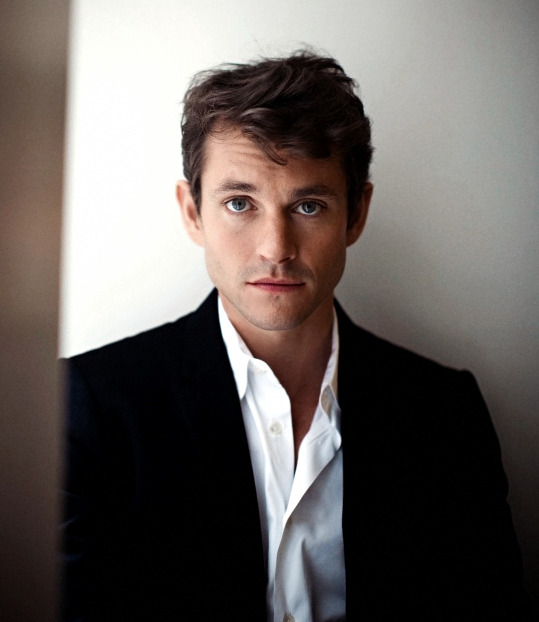
Hugh Dancy: Not just another heart-throb Hugh
Hollywood, watch out. There's a new charming, floppy-haired British actor in town. But Hugh Dancy is much more than a conventional rom-com hero. Gaynor Flynn meets him 07/08/2009
British actor Hugh Dancy is staring out the window at a small lake of screaming fans. If they weren't yelling out things like "I love you, Hugh" and "you're a hottie, Hugh" he wouldn't believe they were here for him. He looks around nevertheless. Nope. No sign of Jackman, Grant or Laurie – so he must be the Hugh they want.
The 34-year-old had "noticed" things had been a bit different of late. Since Confessions of a Shopaholic to be exact, which was released earlier this year. The fact that he was cast in the shiny romcom was proof that after playing the love interest in dramas like Daniel Deronda, King Arthur and The Jane Austen Book Club, ensembles that were then about bigger names than him, Hollywood decided he was ready to carry a film. In other words, they thought his heart-throb oomph would equal box office dollars. It did – over $45m of them.
Dancy probably hoped his latest film, Adam, might extinguish the heart-throb thing a bit. Unlikely, because even though he's neither dashing nor debonair in this story (Adam has Asperger's syndrome) he is adorable. Best not mention that now though. The man has enough on his plate.
Directed by Max Mayer (Better Living), Adam is a story about a young man who is highly intelligent but emotionally inept because of his condition. When the bubbly Beth (Australian actress Rose Byrne), moves into the apartment above, he begins to build the personal relationship he desperately desires. The only problem is, he has absolutely no idea how to go about it.
It's a lovely little film about the difficulties of making a real connection with another human being. The film won the Alfred P Sloan award at the Sundance Film Festival earlier this year.
"I didn't think 'lovely little film'," laughs Dancy when asked what piqued his interest about the role. "I thought 'that is bloody huge'. But my first reaction was to realise how little I knew and how much I would have to learn."
He dutifully read "everything", hung out with people with "Aspys", and "observed, observed, observed". Still, it must have been a daunting task?
"You always worry about whether you can pull something off," he says. "It's part of the process. Unquestioning confidence in yourself is not an advantage in this game, particularly. So I'm fairly self-critical. Having said that, we're not making a documentary, we're telling a love story."
Fans of Extras will no doubt remember Kate Winslet's skit about how "playing a mental" is a ploy for an Oscar. Dancy laughs. He insists it wasn't about showing off his Rain Man skills. "I didn't expect anyone to go see this film," he says. "I did it because it's a way to subvert certain expectations people might have about me. I mean, I'm not running from success but I wasn't thinking 'Oscar'."
It was a smart move because people are beginning to associate Dancy with the romance genre and, while Adam is technically a romantic comedy, it's an unconventional one to say the least.
"I don't sit there and think 'well I did Confessions of a Shopaholic and now I've got to go out and do Chekhov'," he says. "If the next one that comes along happens to be another romantic comedy and I find something in it that appeals to me then great. I operate on almost no system at all."
What appealed here was how we all have a bit of Adam in us. "Adam can see the love, the contact other people have but he doesn't know how to achieve it or express it," says Dancy. "We've all felt those frustrations and those desires to reach across and realise someone fully and most of the time we can't."
Dancy is notoriously guarded about his private life, but a comment like that begs the question, so when was the last time he felt that desire and for whom? His vivid blue eyes flash. "I haven't had that particular experience in a while," he says coolly.
Dancy is engaged to American actress Claire Danes. The pair met in 2007 on the set of Evening, an intense, but rather forgettable drama. Not long after that he ended a 10-year relationship with British artist Annie Morris. Rumour has it that the pair will wed in France this September. Dancy won't confirm or deny those reports.
"Can we change the subject?" he asks.
You wonder how he will cope with the scrutiny in the long term. Being one-half of a Hollywood couple doesn't equal anonymity. They're already papped relentlessly and the interest will only increase with his profile.
"You can choose how much to let that into your life," he says. "And I find that it's peripheral and I don't even like talking about it, because I find it to be a distraction. And it's something that doesn't usually come up in my life until I do these interviews. I mean, I understand the interest. I'm not saying 'holier than thou', but it's not an issue in my life."
Dancy is brilliant in Adam, so it's rather surprising to learn that he wasn't even on Mayer's original wish list. "I didn't think he had the necessary insecurities," says Mayer. You wonder what Dancy makes of that.
"Being rejected is always hard to take," he laughs. "Sometimes it's based on criteria that feels a little shallow, but you have to accept they know best or you'd go crazy. So, generally, I'm more conscious of how lucky I've been rather than the opportunities I haven't had."
Despite the Zen-like spiel, he went after Adam with a "vengeance" and after a two-hour meeting the director decided Dancy did possess the "prerequisite insecurities". Like what? "I'll let Hugh answer that," laughs Mayer.
Dancy smiles wryly. "I don't think I'm any more insecure than the next person. I try not to let myself become too neurotic. To some extent paranoia in this industry is just a realistic outlook, it comes with the territory, but I try not to drive myself totally insane."
Dancy was 17 when he realised he'd already made the decision to become an actor. "Subconsciously that idea was there," he says. "But I didn't immediately want to become a professional actor. I wanted to go to university. So I studied literature at Oxford [he's sort of like the male version of Natalie Portman], but I also knew down the line that's what I'd try and do for a living. I'd been acting at school in a pretty serious way since I was about 13."
Dancy is the son of the British philosopher Jonathan Dancy. His mother, Sarah, is a freelance editor for Oxford University Press. His brother, Jack, owns a travel company in Paris. His sister, Kate, works for Save the Children. Dancy was 10 when he was sent to board at the Dragon School in Oxford. Once puberty hit he became a "bit of a tearaway". Girls, booze and cigarettes all landed him in trouble. One day he was sent to the drama department as penance. He never left.
He waited tables for a time after Oxford and "contemplated" the fact that he might not make it.
"I think anyone with half an ounce of intelligence has to allow for that possibility," he says. "Because the odds are stacked against you. But I got very lucky very quickly, so my commitment was never really tested in that way.
"But at the same time I was very clear about why I wanted to do it." Which is? "I love it and it gives me immense satisfaction. My only goal now is to continue doing it.”
54 notes
·
View notes
Note
Since you're just about to start vol 7, is there any theories you have going forward? Is there something you really want to see happend? Have you been spoiled for anything?
Putting this under a “Read More” because this is just one thing after another…
Theories? In hindsight after writing all of this, most of it is not the main cast because I guess at the moment, they’re rather well-adjusted and/or recovering from their issues rather well lol, so I can’t make big enough guesses on them right now.
Emerald and maybe Mercury GTFO there, I think being stuck in Salem’s castle with Hazel until whatever goes down in Atlas I guess will
Emerald becomes a Maiden, my guesses are:
A “redeemed” Cinder thinks of Emerald in her last moments, but it’s kept vague if she was thinking of her because she actually cared about her or because of something completely unrelated to that (ex. “Emerald better have-*gets killed midsentence*”).
Otherwise, Cinder finds out Emerald is now a Maiden and turns against her. Now Emerald has to deal with her mother figure, the woman who saved her life, wanting her dead.
Either way, I think this could lead to her redemption.
Mercury is pretty hard to read, especially after what he said in V6 about why he acts the way he does and how he feels about his relationship with Cinder and Emerald. Tyrian summed him up as just putting up a tough exterior because he doesn’t know anything else, so if something like Emerald going rogue happens, then it’ll be interesting to see how long he’ll keep those barriers up against Emerald.
Cinder “redemption” arc. I don’t know how, but it would constitute showing her backstory (because that infatuation for power and not wanting to be powerless has to come from something, and she’s based on Cinderella, so.). V6 already had Salem basically kicking her out of the house for disobeying her (albeit she’s apparently still keeping an eye on her…), so Cinder left to her own devices could end up doing a lot more loose cannon-y things outside of trying to get revenge on Ruby and this eventually leads into her becoming an anti-villain and something of an anti-hero?
Pyrrha’s and maybe Amber’s souls are actually connected to Cinder, kind of like with Ozpin and Oscar, because 1) Maiden mechanics? and 2) It seems strange to me that back in V3 when they hooked up Pyrrha to Amber in that aura transfer machine, they made a big deal out of how Pyrrha “might not be the same” if the transfer works but then she died anyways so that part seemingly didn’t matter outside of brief angst? At the moment, I don’t know where this would go other than Pyrrha and Amber kind of haunting Cinder like ghosts, maybe this could lead to her “redemption”?
After what happened with Vernal, I don’t know what to make of Winter Schnee and Summer Rose as possible Maidens, but it seems relevant? We’ll just have to wait and see.
Likewise, I don’t really know where Hazel’s arc may go, either they’ll keep him as someone who refuses to move forward and ends up dying a bitter, meaningless life, or he’ll finally realize that and maybe help the heroes against Salem and/or Em & Merc leave Salem (I think him trying to take the blame for Cinder’s failure in V6 was foreshadowing), probably at the cost of his life because I can’t imagine him turning against Salem and managing to walk away alive.
Weiss tearing Jacques a new one, because we got Yang doing that to Raven in V5 and Blake (and Yang) doing it to Adam in V6 too, so I think we’ll continue to see cycles of abuse, hate, spite, and so on get broken from this point on.
And also take Whitley and GTFO there too, it’d be neat to see him unlearn his behavior from being under Jacques this whole time and I guess “redeem” himself… I have no idea who should take him in but he could stay with Maria if she and the group are parting ways in Atlas, it probably wouldn’t be safe for him to tag along with RRAYNBBOW (or however they’re called now lol). I pretty much envision this as what Eh**z said about Azulademption if it had happened in ATLA (”I’m happy.” “Yes, we know you are, Whitley.”).
Tai fighting, because they’ve established him as being retired while Raven and Qrow are still in action, so I think we might see him fight at some point as things come to a head.
Because RWBY is a good show that knows how to properly “subvert expectations”, it is to be expected that a lot of questions and mysteries will get answered (ex. Almost everything about Summer, Raven/The Spring Maiden subplot to come back, probably if a Maiden killing another Maiden actually boosts their power or not, whatever they have to do to teach Salem her lesson, etc.), and there are a lot of endgames they’re likely building up to (ex. Salem is defeated, Oz and Salem reunite and reconcile in the afterlife, Oscar is the last Oz reincarnation because Oz’s quest finally gets a happy ending, the Gods leave Remnant alone, maybe the Grimm disappear from Remnant, etc.).
Things I want to see happen (outside of ships because I think y’all know already lol):
I think this is a victim of the show trying to find its footing early on, which does happen, but I think it would be/have been neat if we got to see Ruby’s friends from Signal at some point (I’m guessing this might be prime self-insert OC material) or at least get a glimpse of the “elementary”/”primary” Huntsmen academies, if only because I like worldbuilding/lore and Chekhov’s guns/foreshadowing :P. Though I doubt this will happen since the show is moving in a really different direction from the school setting it had back in V1-V3, which is fine.
Jacques joining Adam in clown hell
STRQ flashbacks, and maybe a TRQ reunion? Again, I can see this as something happening as things come to a head, especially since this would require Raven to kind of turncoat back to the good guys.
EDIT: I would also like to see Goodwitch come back, but I guess that might be a while since we’re focusing on Atlas at the moment and then presumably Vacuo?
Watts shaving his dumb moostash
More anime voice actors, because OH WOW IT’S AMAZING HOW THE ACTING INDUSTRY WORKS, HUH VI?
I think that’s all I can think of for now… Anything else I usually wonder about is something I bring up in my liveblogs? I think??
Have I been spoiled for anything? Yeah, I guess, but it was because of people rb’ing RWBY on my dash/TL/whatever before I started watching the show, so I didn’t have context and I didn’t think much of any of it beyond that they looked neat. That, plus me having the memory of a goldfish about all of that probably helped… For example, ask me about Homestuck, The Adventure Zone, Critical Role, The Arcana, etc. because I see those on my dash a lot, but I have no idea what they’re about other than maybe some general info and a couple of character names.
That being said, I knew/know about some characters that hadn’t/haven’t shown up yet because that’s pretty hard to avoid (at the beginning, I only really knew RWBYJNPR, Sun, Penny, and also Ozpin, Qrow, and Summer but pretty much in name only; back when V7 started, I did notice a lot of popularity with certain characters from that volume), and some things I did know like someone being able to turn into a bird (when the Faunus lore got introduced, I thought this was going to be a Faunus power lol*), Blake was or was not a cat-person, Summer being gone, Bumbleby being the ship, and maybe more that I can’t remember at the moment.
* …“What I expected vs. What I got: RWBY Edition” is probably something that warrants its own post. Hmm…
It’s 3 AM and this is a huge garbled mess, but as you might guess, I’m really invested in RWBY right now and it’s fun wondering where they’ll take the story next. This is quality.
10 notes
·
View notes
Text
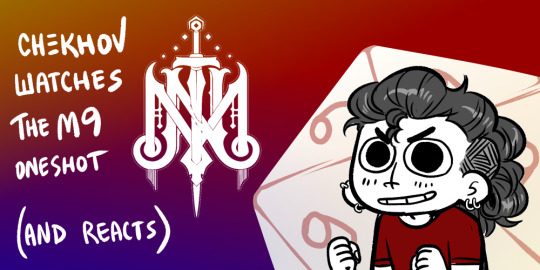
ECHOES OF THE SOLSTICE (PART 2)
This picks up in the middle of the game! Please read part one first if you haven't already.

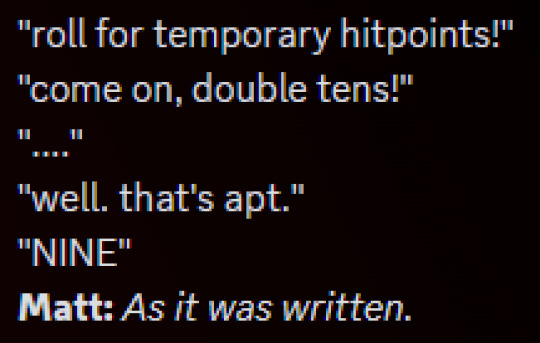



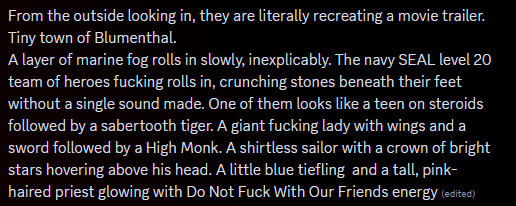
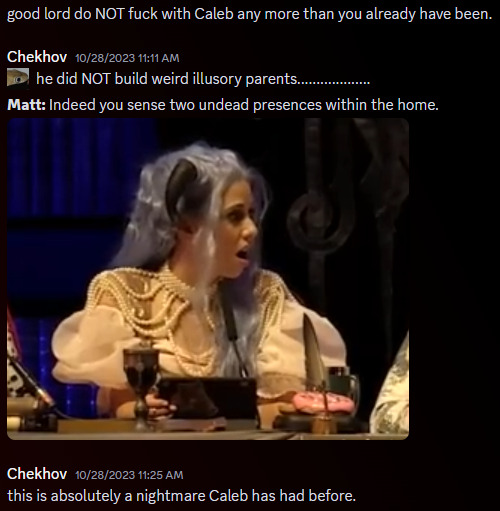


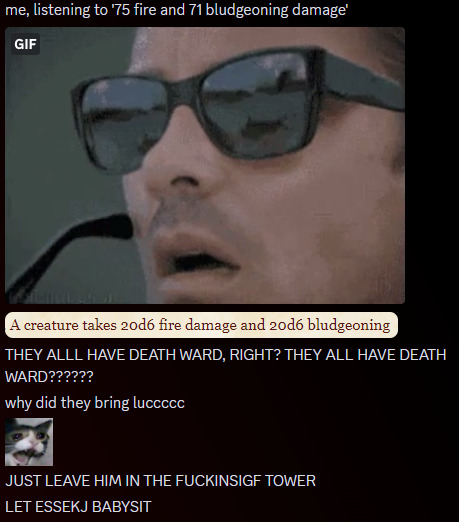

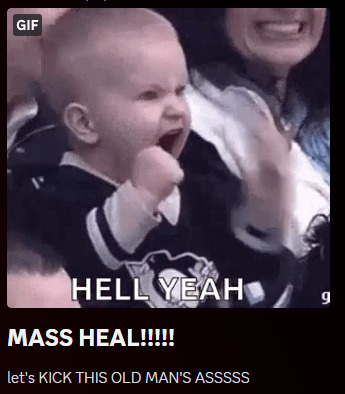

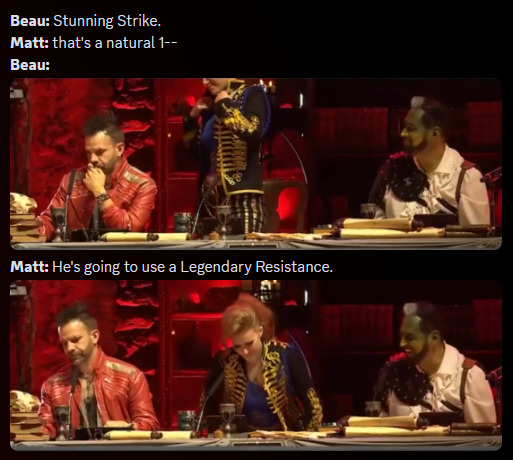



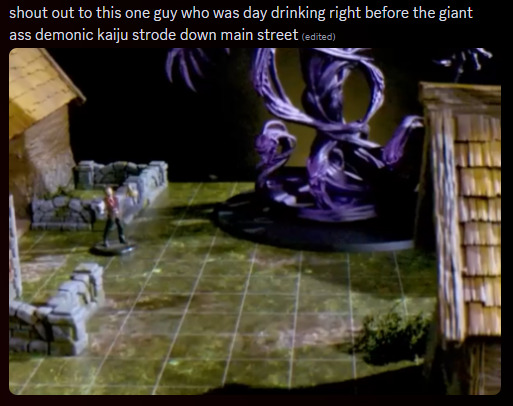



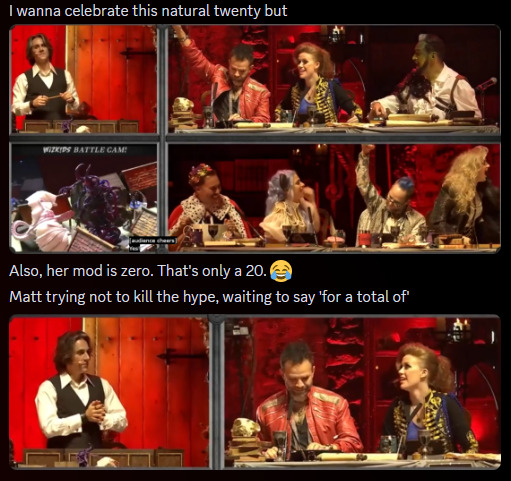
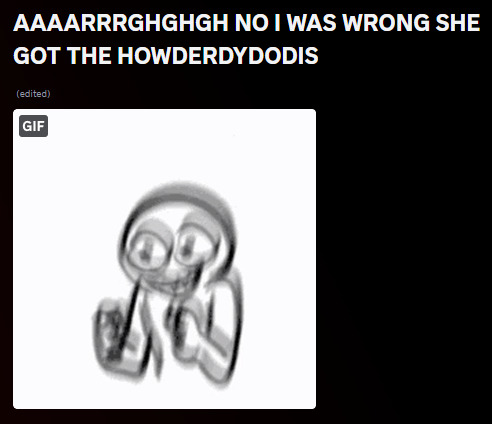

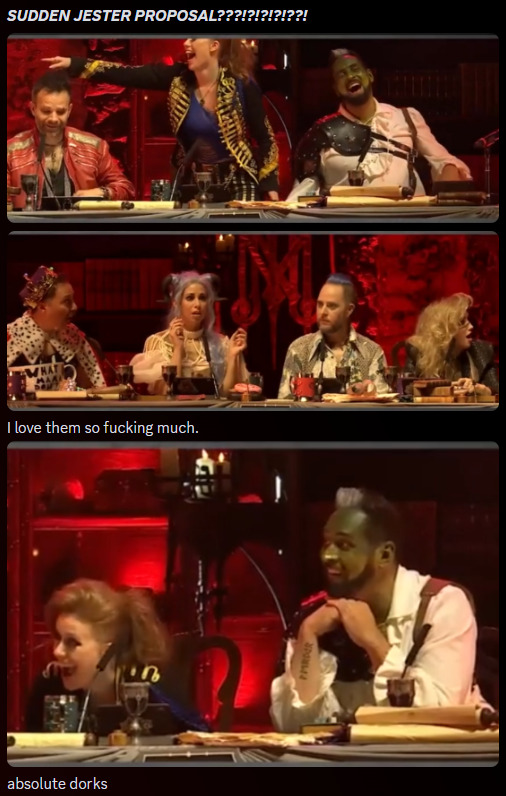

Well. What can I say. I'm absolutely delighted.
In a way, I love the fact that the Mighty Nein never wound down like Vox Machina did. I was sad when, at the end of campaign 2, there seemed to be so much still left to do... but this is somehow healing me. The fact that they have so many chances, still, to come back over and over again and watch these characters grow old and enjoy themselves and go on endless other adventures.
Thanks Mighty Nein! You saved the day again, without anyone knowing about it.
#chekhov watches critical role#chekhov watches cr2#chekhov watches echoes of the solstice#echoes of the solstice#critical role#critical role echoes of the solstice#mighty nein#cr2
184 notes
·
View notes
Text
'By his own admission, awards season has been bittersweet for Andrew Scott.
Currently basking in a flurry of positive reviews for his starring role in a new Netflix adaptation of Patricia Highsmith's The Talented Mr. Ripley, Scott recently collected the Critics’ Circle Theatre award for his remarkable performance in a contemporary rendering of Chekhov masterpiece Vanya.
But the occasion was tinged with sadness for the Irish star, 47, whose devoted mother Nora passed away with a 'sudden illness' in March - shortly before Mother's Day.
And Scott - who dedicated the award to her memory by telling audience members “she was the source of practically every joyful thing in my life” - admits he felt compelled to immerse himself in work following her recent passing.
'Well, you know, you have to — life goes on, you manage it day by day,' he told the Sunday Times.
'It’s very recent, but I certainly can say that so much of it is surprising and unique, and there is so much that I will be able to speak about at some point.'
A devoted follower of fashion away from screen and stage, Scott admits his love of clothes came from his mother and her passion for the arts.
'My mother was an art teacher, she was obsessed with all sorts of design,' he recalled. 'She loved jewellery and jewellery design.
'Anything that is visual, tactile, painting, drawing, is a big passion of mine, so I have tremendous respect for the creativity of designers.'
Despite the tragedy, Scott has attempted to maintain a positive attitude towards both his personal and professional life.
'I feel like, as a person, I am quite near my emotions,' he said. 'I cry easily and I laugh easily, and there is nothing more pleasurable to me than laughing.'
Nora's death was confirmed in a statement on March 9, with family members adding that she passed away on Thursday March 7 surrounded by her family at St Vincent's Hospital in Dublin.
An obituary read: 'It is with our deepest sorrow that we inform you of the passing of Nora Scott (née Boyle), beloved wife of Jim, mother of Sarah, Andrew and Hannah.
'Scott, Sandymount, Dublin, formerly Omagh Co. Tyrone, March 7th 2024 peacefully surrounded by her loving family and best friend Anne, in St Vincent's Hospital following a sudden illness.
'Nora will be deeply missed by her beloved husband Jim, her loving children Sarah, Andrew and Hannah.'
In 2018, Nora revealed Anthony Hopkins sent her 'more than three dozen red roses,' after finding out she was ill when speaking to Scott on the set of King Lear.
Hopkins, 86, starred in the BBC's Shakespeare adaptation as an ‘English Stalin’ with Scott playing Edgar - who becomes Lear’s secret protector.
She told RTE’s Ryan Tubridy at the time: 'There was probably more than three dozen red roses and attached to them was a little card from Anthony saying "Be well, sending hugs", and all sorts of things.'
'I was thrilled to get such a gift and for the kind thought that promoted it.
'Now I have recovered, I can enjoy these exquisite roses that grace our hall. It was such a beautiful gift.'
In January, Scott and his co-star Paul Mescal admitted they weren't too keen on their family members watching their new film, gay drama All Of Us Strangers.
The movie stars Scott as a screenwriter drawn back to his childhood home who enters into a relationship with a mysterious neighbour, played by Mescal, 27.
The film features several intimate scenes between the actors which the pair discussed during an appearance on The Graham Norton Show.
Asked if their families had seen the flick yet, Mescal said: 'With the Irish premiere, trying to allocate tickets to all the aunties and uncles is a tricky business.
'They have seen my bum before but there is a little more going on in this movie I would say!'
Scott added: 'I don't want to be there when my parents watch it!''
#Andrew Scott#Nora Scott#Critics Circle#Vanya#Chekhov#West End#All of Us Strangers#Paul Mescal#Ripley#Netflix#Patricia Highsmith#The Talented Mr Ripley#Edgar#King Lear#Sir Anthony Hopkins#The Graham Norton Show
4 notes
·
View notes
Text

Got both, although I’ve just realised that I never knew anything Deep about either huh.
1. The Boy
i dont even care that i just keep repeating this story over and over again of how he almost got murdered by Klyuev on the set of the musketeers lmao. Klyuev’s character barely had any fighting scenes, if at all, so he didn’t receive any sword training, cue a fite scene and somehow he managed to jam his sword in Boyarsky’s fucking mouth, a few centimeters away from his brain and death. Boyarsky didn’t even suffer that much, surprisingly
Boyarsky actually comes from a whole acting dynasty, his daughter is a (bad) actress and she was in the first nrh ep, his late brother was an actor, his uncle, and I think his dad as well and even his grandad was something else too. Obviously besides the daughter, none of the men in the family lived past like 50 and Boyarsky once said it was a mistake that he’s still alive.
A sub-fact no one wants to know: the dude just,,, does not enjoy living. It’s been twice already that I read him casually mentioning how life can go fuck itself but sometimes there is shite to somewhat enjoy (the shite in question was his daughter’s second pregnancy recently), but otherwise, he really does get these Death Episodes often.
The meme facts a true Boy fan must know is his hat, his shades and his zenit scarf. I think the most popular google search besides his name is his name + no hat bc he just never fucking takes it off (cuz he bald af). Shades cuz aesthetic, zenit scarf cause he’s a big fan of that football club, and of football in general, I’d say that your chances of seeing Boyarsky at a zenit football match are something like 85%. The Boy is perfectly aware of the memes too and he loves making fun of himself.
quite faithful to his wife, i think he was the only guy on the set of the musketeers who didnt ruin his marriage with their mass sluttery. They once divorced for some tax evasion reasons or something like that and only bothered to remarry like almost a decade later. I think for tax reasons too. They don’t give a fuck.
2. Tabak
big fan of drag, it seems: i can recall at least two films where he jumped on an opportunity to dress as a woman and enjoyed every second of it. For his Marry Poppins role, he shaved his legs and did his nails and everything despite literally nobody asking him, and none of that being even visible in the film. I think he just knew there was no masculinity to his image so boy did he use that to his advantage.
weirdly enough I think I can say that for a fact that he didn’t like Smoktunovsky lmao. these assholes were theater colleagues and all, but there is no trace of them interacting and no trace of them saying anything at all about each other, never mind good or bad. Tabak only mentioned smoktun once (1) in his book in a line of something like “yeah ppl like smoktun and co and their stories of how apparently nobody noticed them for a long time and it was hard to get recognition are just no true” passive-aggressive shite, while smoktun’s story was RIGHT THERE of how he used to sleep on staircases and got rejected from like five theaters and was literally a banned outlaw i was like asdfhj you can say it, mate, the guy’s been dead for a while now. The biggest piece of evidence was a passing mention from Tovstonogov, the director of BDT, who was discussing newspapers and what material gets through and said “yah tabak recently sent em an article criticizing smoktun’s new role and it got rejected” i almost wheezed how true my suspicions are. no most ambiguous crossover for us, then.
a big friend of Gaft who NEVER fails to tell you the story of how tabak in his uni days used to smoothly approach folks finishing their food at the uni canteen and ask them if he can lick the plates after them. which he did. and he licked em nice and clean. Gaft being Gaft he obvs immortalised the Feat in his epigrams and I swear his interview from like 2015 went like “yeah hello im fine too how are yoANYWAY TABAK LICKS PLATES” he will just not let this die.
Gaft being Gaft’s, here’s one of his epigrams on tabak, poorly translated by me, but a one you (lily) will defs get:
The stance is straight. The speech is strong,
Of Lyolik, of Tabakov,
Shines, shines his star,
On the jacket of Mikhalkov.
After Efremov’s death, he became the head of Chekhov’s MHAT (the theatre) and remained its leader until his own death, so 2002-2018 this guy was crackin down. He was an amazing manager who renovated the theater, sometimes even using his own money: repairs, new tech, art and play-wise, everything. He also managed a theater of his own, Tabakerka (about to be renamed a boring Tabakov’s theater instead of keeping the Tobacco Pouch smh), also successfully. He also taught actors for a long ass time and he had a crazy knack for selecting future talents: Yevgeny Mironov, Vladimir Mashkov, Natalia Andreychenko, Filipp Yankovsky are just the people I can name on top of my head, with the first two being his favest and most prominent students, and for a reason (i luv them). Half the modern Russian scene was taught by him, the guy was just amazing at the administrative and leading sides.
Last tier 10 fact bc only like three people know it, in my final year tabak was apparently looking into enrolling his daughter in my school. I don’t think she went in the end, but during his visit, the guy gave my school a giant box with all the films starring himself on DVD. im still like “....ok” about this lmao but i sure hope these fucks are watching his films at school now, the so-called tabak care package. did he just have spare boxes of films with himself in case he needs to smother somebody how ᵈᵒ
Once again, THIS WAS BROUGHT TO YOU BY ASK ME A QUESTION BS
#mikhail boyarsky#oleg tabakov#these are pretty good neutral guys on facts#aint done nothing wrong in their live#s#QUESTION TIM BITCH
14 notes
·
View notes
Photo

Famous Muses & Girlfriends in Filmmaking Pt. 19
MUSE: Frances McDormand (full name Cynthia Ann Smith/Frances Louise McDormand)
Frances was born on June 23rd, 1957 in Gibson City, IL and adopted only a year and a half later by Vernon and Noreen McDormand. During the adoption process, Vernon and Noreen changed Frances’ legal name from ‘Cynthia Ann Smith’ to ‘Frances Louise McDormand.’ The McDormand family moved around the country frequently because of Vernon’s work as a pastor. They lived in Georgia, Kentucky and Tennessee before settling in Monessen, PA, where Frances went to high school. She got her Bachelor’s Degree at Bethany College in West Virginia in 1979 and her Master’s at Yale’s School of Drama in 1982. Frances and roommate Holly Hunter regularly auditioned and performed in plays in NYC in the early 1980s. In 1983, filmmaking partners Joel & Ethan Coen’s movie debut Blood Simple. (1984) was greenlit, and they were interested in Holly playing the lead role. But she was already committed to two stage productions in Louisville, KY that season, and had to pass. Holly did however, directly suggest Frances to the brothers, even though she had only performed in theatre at that point.
Joel and Ethan were instantly impressed with Frances’ audition. Yet she actually turned down the follow-up screen test because she promised her then boyfriend she’d watch his first acting TV appearance. But the writer-directors were so impressed by her nonchalance at the casting process, they still wanted her to play Abby in Blood Simple. Sometime during filming, Joel and Frances started going out together and by the time the crime drama was released to rave reviews, the actress and director were married. While they were dating, Joel got Frances interested in noir novels by James M. Cain and Raymond Carver. In a 2014 interview with The Daily Beast, Frances revealed that after reading Cain’s The Postman Always Rings Twice, she and Joel spent a whole night talking about the book and drinking hot chocolate (aww). After Blood Simple. wrapped, Frances and Holly moved from NYC to LA and lived as roommates with Joel and Ethan for a year. In a 2017 interview with the New York Times, she also revealed that her wedding band was originally Joel’s first wife’s. Apparently they thought it would save money and be less wasteful (whatever works, I guess…).
While some Hollywood couples have said it can be awkward working together on a set, Frances says it’s always been refreshing. For the past 35 years, Frances has appeared in the Coen Bros. movies more than any other actor. Their films include Raising Arizona (1987)—also with Holly, The Man Who Wasn’t There (2001), Burn After Reading (2008) and Hail, Caesar! (2016). Since 1984, Frances has been consistently praised and favored by critics and fans as a great talent. She won Best Actress at the Academy Awards twice, for portraying Marge Gunderson in Joel & Ethan’s Fargo (1996) and Mildred Hayes in Martin McDonagh’s Three Billboards Outside Ebbing, Missouri (2017). She also has three Oscar nominations for Best Supporting Actress with Mississippi Burning (1988), Almost Famous (2000) and North Country (2005). On stage, Frances has performed in revivals of Shakespeare’s ‘Twelfth Night’ (1982), Chekhov’s ‘Three Sisters’ (1985), Arthur Miller’s ‘All My Sons’ (1986) and Tennessee Williams’ ‘A Streetcar Named Desire’ (1988). The latter she received a Tony nomination for Best Supporting Actress as Stella Kowalski. In 2014, she won Best Actress in a Mini-Series at the Emmys for Lisa Cholodenko’s “Olive Kitteridge.” During the press room after winning her Oscar for Fargo, Frances joked that she got the movie role and award because she was sleeping with the director.
In 1995, Joel and Frances adopted a son, Pedro. As of 2018, they are still married and currently living in Bolinas, CA.
9 notes
·
View notes
Text
Tom Hiddleston: Not just a Romeo
By Ajesh Patalay for The Telegraph, 30 Aug 2008
With film and stage roles falling into his lap straight from Rada, Tom Hiddleston has become the name to watch. By Ajesh Patalay
Acontemporary of Tom Hiddleston's at Rada describes him as 'very talented, very charming, aristocratic hair'. And so he proves. At 27, Hiddleston is one of our most exciting young actors, particularly for his stage work. 'Remember that name,' urged one critic, following Hiddleston's dual role as Cloten and Posthumus in Cheek by Jowl's production of Cymbeline last year. 'One day that lad is going to be a star, and deservedly so.' For his Cassio in the Donmar Warehouse production of Othello last November, in which he starred opposite Ewan McGregor and Chiwetel Ejiofor, he was deemed 'first-rate' and 'a name to watch'.
'It was pressure,' Hiddleston admits, 'but you felt everyone just wanted to make it work. You raise your game.' Both plays earned him nominations for the Olivier Award for Best Newcomer. He won for Cymbeline. 'In one sense that meant every-thing. I felt like I had been invited to the party.'
Next Hiddleston is starring alongside Kenneth Branagh in a new Donmar West End production of Chekhov's Ivanov, adapted by Tom Stoppard. 'I could listen to him all day,' Hiddleston raves about the playwright when we meet a week into rehearsals at a restaurant in Waterloo. 'He's so knowledgeable and articulate, it's quite special to have him in the room.'
Hiddleston himself proves bright, eloquent, easy company; and today sports a glowing tan (from two weeks spent visiting his sister in India) plus a goatee beard, which he has grown for his role as Lvov, the self-righteous doctor in Ivanov.
'Tom has a number of things that come very naturally to him,' Michael Grandage, the director of Othello and Ivanov, says. 'His height, his look, how he carries himself. Plus he has an exceptional ear for making language that is 450 years old sound alive, which is why I cast him in Othello. The reason he is in Ivanov is that I enjoyed working with him so much and found to my delight how astonishingly versatile he is.'
Hiddleston wanted to act from an early age, but wasn't always confident about making it his profession. 'It seemed too mysterious and precarious a life to commit to.' There were no actors in the family (his mother is a stage manager, his father a physical chemist) and although he acted at prep school in Oxford and then at Eton (the first in his family to go), it wasn't until he reached Cambridge, to read classics, that he changed his mind.
In his first term he was spotted by a casting agent in a production of A Streetcar Named Desire, which led to a role in an ITV production of Nicholas Nickleby and to his securing an agent. 'It seemed a ridiculous thing to be given when so many people at Cambridge were struggling to get an agent. At that point I allowed myself to want to be an actor as much as I think I'd always wanted to be.'
Still at Cambridge, he landed roles in Conspiracy, a BBC/HBO co-production, starring Branagh, about the Wannsee conference (a 1942 meeting of top-level Nazis in 1942 that resulted in the Final Solution), and the Winston Churchill biopic The Gathering Storm opposite Albert Finney and Vanessa Redgrave. Then, having graduated with a double first, he set off for Rada.
'I thought theatre people wouldn't see me if I hadn't trained. I didn't want to just be the Brideshead guy, to spend the rest of my life wearing waistcoats.' He relished the experience. 'I got the chance to try everything. Not just Romeos, but pimps and grandfathers and even one role as a woman in a Naomi Wallace play called Slaughter City.'
In 2005, fresh from Rada, he was cast in his first film, a British independent called Unrelated, directed by Joanna Hogg, which won an inter-national critics' award at this year's London Film Festival and is released next month. In it Hiddleston plays an 'irresponsible, devil-may-care' 19-year-old whose 'way of interacting with the world is to flirt with it'.
As for Ivanov, it is as much a reunion with Branagh as it is with Grandage. The two actors have just spent 12 weeks in Sweden filming a television series called Wallander based on the detective novels of Henning Mankell. 'Ken is calling it his Hiddleston year,' Hiddleston says.
For the future, who knows? Hiddleston hopes perhaps for more films. He has been to LA once, he says, but they didn't know what to make of his wildly diverse tastes: Judd Apatow (the producer of Knocked Up) and Ibsen in the same breath. But for now, it's all eyes on Ivanov. His evident focus recalls something Grandage says: 'He is clearly one of our younger actors who is going places. But in his head he seems to be taking everything at a good pace. That's what I love about him.'

Original article here: http://www.telegraph.co.uk/culture/3559452/Tom-Hiddleston-Not-just-a-Romeo.html
25 notes
·
View notes
Link
WHEN I STARTED my MA in creative writing at the University of East Anglia in the fall of 1990, Kazuo Ishiguro had graduated from the program a decade earlier, but his presence was like the truth in his novels — invisible and persistent. The previous year his third novel, The Remains of the Day (1989), had won the Booker Prize. In workshop, Malcolm Bradbury told us the genesis story of Ishiguro’s fiction (or a version of it): how his initial submissions had featured a familiar British reality, and how it had taken half the first semester for the class to get him to pay notice to his name (Ishiguro was born in Japan but moved to Britain with his family when he was five). That fall was the 20th anniversary of the course, co-founded by Bradbury and fellow novelist Angus Wilson. At a weekend of readings and festivities, one alumnus introduced herself to a classmate of mine by stating her name and adding simply, “Ishiguro’s year.”
2017 was once again Ishiguro’s year. On October 5, the Swedish Academy announced that “English author Kazuo Ishiguro” had won the Nobel Prize in Literature. The citation, in its trademark italics, lauded him for “novels of great emotional force,” in which Ishiguro “has uncovered the abyss beneath our illusory sense of connection with the world.” That is, I think, an eloquent and useful description of Ishiguro’s inimitable fictions. But it’s incomplete. Those novels also have a sturdy connection with the world. Ishiguro possesses an acute sense of the political and historical forces at work in the lives of his deluded narrators, forces with which they often conspire. Subsequently, these bit players in history retreat from the real — and, by means of fantasy and forgetting, help dig that abyss.
For more than 30 years, Ishiguro’s work has taken a quiet, clear-eyed stand against extremism and intolerance. His first three novels form a loose “shadow of fascism” trilogy. Another destructive shadow hangs over his 1982 debut, A Pale View of Hills, which flits between contemporary England and the city of Ishiguro’s birth, “Nagasaki, after what had gone before.” What had gone before was, of course, the Bomb. It’s apt, therefore, that Ishiguro became the Nobel laureate in a year when vintage evils that we thought — or fooled ourselves into believing — that we had left behind in the 20th century, such as Nazis and the threat of nuclear war, came stomping back into view.
Now we are on guard against any of this becoming normalized. That need for vigilance, I’d argue, makes some of Ishiguro’s work required reading. His novels are often cautionary tales of normalization. As Etsuko, the narrator of that first novel, warns us, “it is possible to develop an intimacy with the most disturbing of things.” It’s a lesson borne out by her sister-in-suffering, Ruth, part of the love triangle at the heart of Never Let Me Go (2005), another novel set in a deceptively tranquil England. Ruth’s upbringing — and that of her intimates, Tommy and narrator Kathy — gives us a chilling new sense of the phrase “formative years”: these twentysomethings are clones; their education has inoculated them against the horror of their raison d’être: they are the human equivalent of Kobe cows — relatively pampered and designed for doom. In their prime, with clinical savagery, the trio’s organs will be harvested to prolong the lives of ailing “normals.” Ruth’s acceptance of this fate has a terrifying carapace of rationality:
I think I was a pretty decent carer. But five years felt about enough for me. I was like you, Tommy. I was pretty much ready when I became a donor. It felt right. After all, it’s what we’re supposed to be doing, isn’t it?
A Pale View of Hills is also concerned with the costs of an education deficient in critical thinking. Etsuko’s father-in-law, Ogata-San, was a prominent teacher and proselytizer for the imperialist cause. Now in restless retirement, he is preoccupied with a denunciation of himself and an ally that he has come across in a professional journal. The article’s author is Shigeo Matsuda, a former protégé and childhood friend of Etsuko’s husband. In a deftly turned scene, Ogata-San has a most courteous confrontation with Shigeo, from which he receives no satisfaction. At last, the verbal gloves come off, and the old teacher gets a lecture to remember:
In your day, children in Japan were taught terrible things. They were taught lies of the most damaging kind. Worst of all, they were taught not to see, not to question. And that’s why the country was plunged into the most evil disaster in her entire history.
Ogata-San is the pivot between Pale View and Ishiguro’s second novel, An Artist of the Floating World (1986). Here an Ogata-San-like character, complicit in the imperial regime, takes center stage. In the case of Masuji Ono, not seeing and not questioning are acute failures, given his vocation as a serious painter. In his admission early in the book that “I have never had a keen awareness of my own standing,” he speaks more truth than he knows, or is willing to admit. What he has lacked in spine he has made up for in ego.
Living in an unnamed Japanese postwar city, another uncomfortable retiree, Ono, goes through a tortuous self-assessment. In the end, we get a sense that, more than anyone else, Ono, author of no “grand catastrophe,” has betrayed himself, betrayed his talent. Intoxicated with “the new patriotic spirit” of the 1930s, Ono broke his implicit vow to dedicate his working life to capturing “fragile beauty” on canvas and produced crass propaganda posters instead. In a silent storm of a paragraph, Ishiguro brings together Ono’s moral failings and his squandered eye. He has literally turned his back on a former student, Shintaro, whose hopes for a teaching post under the new dispensation appear to depend upon Ono writing a curious letter of recommendation, one that will claim that Shintaro did not share his master’s enthusiasm for Japanese expansionism:
I went on gazing at my garden. For all its steady fall, the snow had settled only very lightly on the shrubs and branches. Indeed, as I watched, a breeze shook a branch of the maple tree, shaking off most of the snow. Only the stone lantern at the back of the garden had a substantial cap of white on it.
Moments like this are when the Japanese sensibility of this “English author” is apparently at its most pronounced. It’s a quality found in the music of Toru Takemitsu, another artist whose work is an intricate synthesis of East and West. Writing about the composer in the Guardian back in 2013, Tom Service related this aesthetic to “the Japanese word ‘ma,’ which suggests the concept of a void that isn’t empty, an absence that is really a presence, a space between things that is full of energy.”
Ishiguro himself is passionate about music, particularly Americana, as the account he gave during his Nobel Lecture about the influence of a Tom Waits song on the emotional dynamics of The Remains of the Day testifies. Back in 2002, playing the role of the “castaway” on that wistful British institution, the BBC radio show Desert Island Discs, Ishiguro chose a wide range of records, everything from an Emmylou Harris ballad to a Chopin nocturne. The latter music he picked for its “quiet, introspective surface, but with very strong emotions underneath,” a description that the alert host, Sue Lawley, related back to her guest’s novels. In response, Ishiguro not only agreed but also cited other examples of work he admires that maintains the same tension: the short stories of Anton Chekhov and the films of Yasujirō Ozu. In Ishiguro’s work, East blends with West; indeed, the two become inseparable.
His tip of the hat toward Ozu, however, is particularly relevant to Ishiguro’s first two novels. Ozu’s canonical Tokyo Story (1953) dramatizes the same post-1945 milieu — a rapidly recovering, and rapidly forgetting, Japan; we are 40 minutes into the film before someone directly references the war. The hallmark of this unapologetically human-scale movie is, in the words of critic David Bordwell, Ozu’s “compassionate detachment,” a phrase that also serves as a good measure of Ishiguro’s distance from his characters.
The most prominent of these is Stevens, the pitiful, culpable butler from The Remains of the Day. Returning to the novel after Anthony Hopkins’s masterful big-screen portrayal of the character, and years of small-screen mansion-house shenanigans on Downton Abbey, one is struck by what a political book it is, with its allegorical suggestiveness about the ordinary citizen’s relationship to power. The novel has a lot to say not only about the pre- and postwar Britain in which the story is set, and the Thatcher-Reagan 1980s in which it was written, but also about our present global moment. “Democracy is something for a bygone era,” declares Lord Darlington, Stevens’s fascist-infatuated employer. “The world’s too complicated a place now for universal suffrage and such like.”
Stevens, in all senses of the word, caters to Darlington’s political meddling. He’s reminiscent of J. Alfred Prufrock: “an easy tool, / Deferential, glad to be of use…” and indeed thinks of himself as the kind of Polonius figure Eliot’s poem evokes: “It’s a great privilege, after all,” Stevens says, “to have been given a part to play, however small, on the world’s stage.” In reality, he has, like Ono, exaggerated his role in worldly affairs. He was Polonius’s valet, Prufrock’s stooge. Of course, a minor participant in a “grand catastrophe” is still a participant. Stevens is on the wrong side of history by one of the country miles he travels on during the motoring trip that frames the story.
The Remains of the Day is one of several novels in which Ishiguro makes a subtle rhetorical move: the presumptive “you.” Just as Kathy assumes her readers are fellow victims and Ono assumes our familiarity with his city, Stevens thinks we are as willing to be duped as he was. It’s an unsettling gesture, but by no means Ishiguro’s most radical strategy. With Stevens, Ishiguro perfected his demonstration of the unreliable narrator, so much so that in his smart, accessible 1992 book The Art of Fiction, critic and fellow novelist David Lodge used The Remains of the Day as his model of excellence in explaining that technique. In that essay, Lodge makes the perfectly sensible argument that
a character-narrator cannot be a hundred per cent unreliable. If everything he or she says is palpably false, that only tells us what we know already, namely that a novel is a work of fiction. There must be some possibility of discriminating between truth and falsehood within the imagined world of the novel, as there is in the real world, for the story to engage our interest.
Three years later, Ishiguro published a monster of a novel, The Unconsoled (1995), which reads like a defiance of Lodge’s artistic logic. Is Ryder, the internationally renowned pianist meandering through a provincial city in Mitteleuropa, 100 percent unreliable? No, but maybe 90 percent. We never sound out the floor of “reality” in this fiction. Even the city, with “utterly preposterous obstacles everywhere,” seems to have been designed by a committee of surrealists. The normally solid elements of narrative — point of view, character, time itself — turn to jelly. It’s as if we have come across the implosion of a more conventional novel, the kind of novel that Ishiguro himself had written back in the 1980s. For that reason, Ishiguro fans tend to think of The Unconsoled as either the black hole or dark star at the center of his oeuvre.
I’m in the latter camp. Yes, the novel breaks Lodge’s law, but there’s ample compensation for that. What we get from The Unconsoled is not so much a story as an experience, one that uncannily replicates Ryder’s own lucid dream of a city sojourn. When he has a “vague recollection,” so do we. When he is lost, so are we. The length of the book is not an indulgence but an essence. Finishing it, we have been homeless for days, and our next stop is Helsinki. No truer word is spoken when one of the city dignitaries remarks, a 100 pages in, “[I]t’s so difficult to see in this light.” Indeed it is. The apotheosis of the unreliable narrator has given birth to the unreliable reader.
For all its defiant oddness, The Unconsoled is still decidedly an Ishiguro novel; you can see the watermark of his persistent concerns. A monument to a figure named Max Sattler suggests that the city has a fascistic past. Moreover, demagogic control seems dangerously close at hand. At one point, Ryder observes an alternative self, a conductor named Brodsky: “Something about him suggested a strange authority over the very emotions which had just been running riot in front of him — that he could cause them to rise and fall as he pleased.”
This concern about how the political atmosphere can revert to the past is at the forefront of Ishiguro’s most recent book, The Buried Giant (2015). The novel is his most historically distant fiction, set all the way back in a post-Roman Britain that is a foggy combination of chronicle and myth; it’s a landscape populated by ogres and dragons as well as Saxons and Britons. But Ishiguro was prompted to write the book by the much more recent killing fields of Rwanda and the former Yugoslavia. “Who knows,” frets Axl, the elderly hero, “what will come when quick-tongued men make ancient grievances rhyme with fresh desire for land and conquest?”
In that question I hear a reversal of the lines, made famous during the peace process in Northern Ireland, from The Cure at Troy (1991), Seamus Heaney’s adaptation of Sophocles’ Philoctetes: “once in a lifetime / The longed-for tidal wave / Of justice can rise up / And hope and history rhyme.” Both poetry and peace, of course, require patience and the delicate use of language. Damage and rancor can happen in the blink of an eye — or a tweet.
A dragon of a different kind, “the Great Opium Dragon,” stalks early 20th-century China in Ishiguro’s 2000 novel When We Were Orphans. Of all his books, Orphans best exemplifies the point I made earlier — that there is such a gulf between Ishiguro’s heroes and the world because they’ve had a bad tangle with that world. Here Ishiguro makes inspired use of his own cultural duality. The foundation of the book is the relationship, in Shanghai’s International Settlement, between narrator Christopher Banks and his childhood friend Akira, a Japanese boy who fears he is not Japanese enough. Shipped “home” after the disappearance of his parents, Christopher tries to allay his own cultural anxieties by wearing the houndstooth costume of that very British role, the consulting detective.
Investigation, “the task of rooting out evil in its most devious forms,” is more of a coping mechanism than a vocation for Christopher. Real evil in the novel does not take the form of the butler in the study with the candlestick. Its scale is industrial, not domestic (though it may be familiar): “the British in general, and [my father’s company] especially, by importing Indian opium into China in such massive quantities had brought untold misery and degradation to a whole nation.” When Christopher returns to Shanghai in 1937 to investigate the persistent mystery of his parents’ fate, another industrial evil looms on the horizon: the Japanese imperial war machine. It’s the dawn of the “grand catastrophe.”
When We Were Orphans, in other words, is set in a world, less than 20 years removed from “the war to end all wars,” on the verge of repeating the folly of the past. It’s a time for vigilance and prudence. “Tensions continue to mount,” Christopher notes; “knowledgeable people liken our civilisation to a haystack at which lighted matches are being hurled.” That passive verb gives the scenario a portability: fresh hay, new hurlers.
In the course of his myopic investigations, Christopher meets many of his kind, justifying the plural of the title. Ishiguro is performing one of his favorite maneuvers, a device he has used to devastating effect as far back as A Pale View of Hills: the collapse of characters into each other. Somewhere along the way, the reader may fall in there, too. When were we orphans? Then. Now.
¤
Robert Cremins is a novelist who teaches in the Honors College at the University of Houston. In 2015, he conducted an onstage interview with Kazuo Ishiguro as part of an Inprint Margarett Root Brown Reading Series event at Houston’s Wortham Center.
The post Ishiguro’s Orphans appeared first on Los Angeles Review of Books.
from Los Angeles Review of Books http://ift.tt/2GKrzYJ
2 notes
·
View notes